Julius Caesar
Roman general and statesman Julius Caesar turned the Roman Republic into the powerful Roman Empire. An assassination ended his reign on the Ides of March.
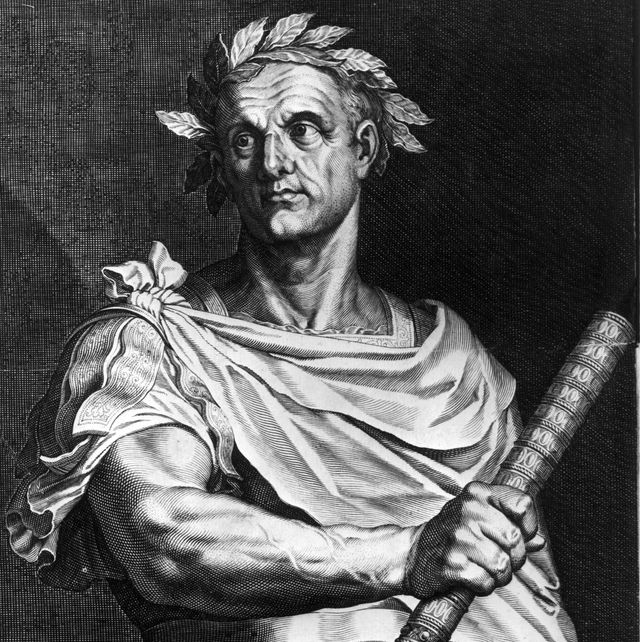

Quick Facts
Julius caesar early life, julius caesar's political career, first triumvirate, early rule and gallic wars, civil war against pompey, crossing the rubicon, julius caesar and cleopatra, dictatorship, julius caesar's death, who killed julius caesar, after caesar’s death, archaeological discovery, julius caesar: a play by william shakespeare, who was julius caesar.
Julius Caesar was a leader of ancient Rome who significantly transformed what became known as the Roman Empire by greatly expanding its geographic reach and establishing its imperial system. Allegedly a descendant of Trojan prince Aeneas, Caesar’s birth marked the beginning of a new chapter in Roman history. By age 31, Caesar had fought in several wars and become involved in Roman politics. After several alliances and military victories, he became dictator of the Roman Empire, a rule that lasted for just one year before his death in 44 BCE.
FULL NAME: Gaius Julius Caesar BORN: July 12, 100 BCE DIED: March 15, 44 BCE BIRTHPLACE: Rome, Italy SPOUSE: Cornelia (84–69 BCE), Pompeia (67–62 BCE), Calpurnia (59–44 BCE) CHILDREN: Julia Caesaris, Caesarion ASTROLOGICAL SIGN: Cancer
Born Gaius Julius Caesar on July 12, 100 BCE, Caesar hailed from Roman aristocrats, though his family was far from rich. Little is known of Caesar’s early years, but during his youth an element of instability dominated the Roman Republic, which had discredited its nobility and seemed unable to handle its considerable size and influence.
When he was 16, his father, an important regional governor in Asia also named Gaius Julius Caesar, died. He remained close to his mother, Aurelia. Around the time of his father’s death, Caesar made a concerted effort to establish key alliances with the country’s nobility, with whom he was well-connected.
In 84 BCE, Caesar married Cornelia, the daughter of a nobleman. Caesar’s marriage to Cornelia drew the ire of the Roman dictator Sulla, as Cornelia’s father was Sulla’s political rival. Sulla ordered Caesar to divorce his wife or risk losing his property. The young Roman refused and escaped by serving in the military, first in the province of Asia and then in Cilicia. Caesar likely returned to Rome after Sulla’s death circa 79 BCE (another account states Caesar, with the help of his influential friends, eventually convinced Sulla to be allowed to return).
Back in Rome, Caesar and Cornelia had a daughter, Julia Caesaris, in 76 BCE. In 69 BCE, Cornelia passed away.
After Sulla’s death, Caesar began his career in politics as a prosecuting advocate. He relocated temporarily to Rhodes to study philosophy.
During his travels he was kidnapped by pirates. In a daring display of his negotiation skills and counter-insurgency tactics, he convinced his captors to raise his ransom, then organized a naval force to attack them. The pirates were captured and executed.
Caesar further enhanced his stature in 74 BCE when he put together a private army and combated Mithradates VI Eupator, king of Pontus, who had declared war on Rome.
Caesar began an alliance with Gnaeus Pompey Magnus, a powerful military and political leader. Soon after, in 68 or 69 BCE, he was elected quaestor (a minor political office). Caesar went on to serve in several other key government positions.
In 67 BCE, Caesar married Pompeia, the granddaughter of Sulla. Their marriage lasted just a few years, and in 62 BCE, the couple divorced.
In 61 to 60 BCE, Caesar served as governor of the Roman province of Spain. Caesar maintained his alliance with Pompey, which enabled him to get elected as consul, a powerful government position, in 59 BCE.
The same year, Caesar wed Calpurnia, a teenager to whom he remained married for the rest of his life. (He also had several mistresses, including Cleopatra VII , Queen of Egypt, with whom he had a son, Caesarion.)
At the same time Caesar was governing under Pompey, he aligned himself with the wealthy military leader Marcus Licinius Crassus. The strategic political alliance among Caesar, Pompey, and Crassus came to be known as the First Triumvirate.
For Caesar, the First Triumvirate partnership was the perfect springboard to greater domination. Crassus, a leader known as the richest man in Roman history, offered Caesar financial and political support that proved to be instrumental in his rise to power.
Crassus and Pompey, however, were intense rivals. Once again, Caesar displayed his abilities as a negotiator, earning the trust of both Crassus and Pompey and convincing them they’d be better suited as allies than as enemies.
In a controversial move, Caesar tried to pay off Pompey’s soldiers by granting them public lands. Caesar hired some of Pompey’s soldiers to stage a riot. In the midst of all the chaos, he got his way.
Not long after, Caesar secured the governorship of Gaul (modern-day France and Belgium). This allowed him to build a bigger military and begin the kind of campaigns that would cement his status as one of Rome’s all-time great leaders. Between 58 and 50 BCE, Caesar conquered the rest of Gaul up to the river Rhine.
As he expanded his reach, Caesar was ruthless with his enemies. In one instance he waited until his opponent’s water supply had dried up, then ordered the hands of all the remaining survivors be cut off.
All the while, he was mindful of the political scene back home in Rome, hiring key political agents to act on his behalf.
As Julius Caesar’s power and prestige grew, Pompey grew envious of his political partner. Meanwhile, Crassus still had never completely overcome his disdain for Pompey.
The three leaders patched things up temporarily in 56 BCE at a conference in Luca, which cemented Caesar’s existing territorial rule for another five years, granted Crassus a five-year term in Syria, and accorded Pompey a five-year term in Spain.
Three years later, however, Crassus was killed in a battle in Syria. Around this time, Pompey—his old suspicions about Caesar’s rise reignited—commanded that Caesar disband his army and return to Rome as a private citizen.
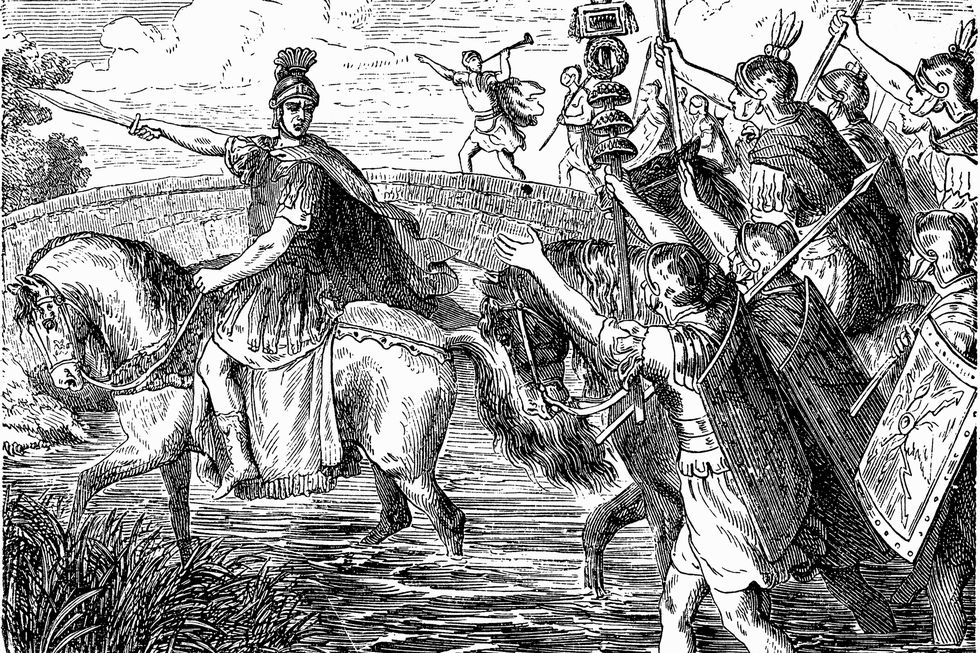
Rather than submit to Pompey’s command, on January 10, 49 BCE, Caesar ordered his powerful army to cross the Rubicon River in northern Italy and march toward Rome. As Pompey further aligned himself with nobility, who increasingly saw Caesar as a national threat, civil war between the two leaders proved to be inevitable. Pompey and his troops, however, were no match for Caesar’s military prowess. Pompey fled Rome and eventually landed in Greece, where his troops were defeated by Caesar’s legions.
By late 48 BCE, Caesar had subdued Pompey and his supporters in Italy, Spain, and Greece, finally chasing Pompey into Egypt. The Egyptians, however, knew of Pompey’s defeats and believed the gods favored Caesar: Pompey was assassinated as soon as he stepped ashore in Egypt. Caesar claimed to be outraged over Pompey’s murder. After having Pompey’s assassins put to death, he met with the Egyptian queen Cleopatra VII.
Caesar and Cleopatra forged an alliance (and a sexual relationship) that ousted her brother and co-regent, Ptolemy XIII, and placed Cleopatra on the throne of Egypt. A skilled political tactician, she and her son by Caesar, Caesarion, proved instrumental in international affairs for years, culminating in her liaison with Roman general Mark Antony .
Upon his triumphant return to Rome, Caesar was hailed as the father of his country and made dictator for life. Although he would serve just a year’s term, Caesar’s rule proved instrumental in reforming Rome for his countrymen.
Caesar greatly transformed the empire, relieving debt and reforming the Senate by increasing its size and opening it up so that it better represented all Romans. He altered the Roman calendar and reorganized the construction of local government.
Caesar also resurrected two city-states, Carthage and Corinth, which had been destroyed by his predecessors. And he granted citizenship to a number of foreigners. A benevolent victor, Caesar even invited some of his defeated rivals to join him in the government.
At the same time, Caesar was also careful to solidify his power and rule. He stuffed the Senate with allies and required it to grant him honors and titles. He spoke first at assembly meetings, and Roman coins bore his face.
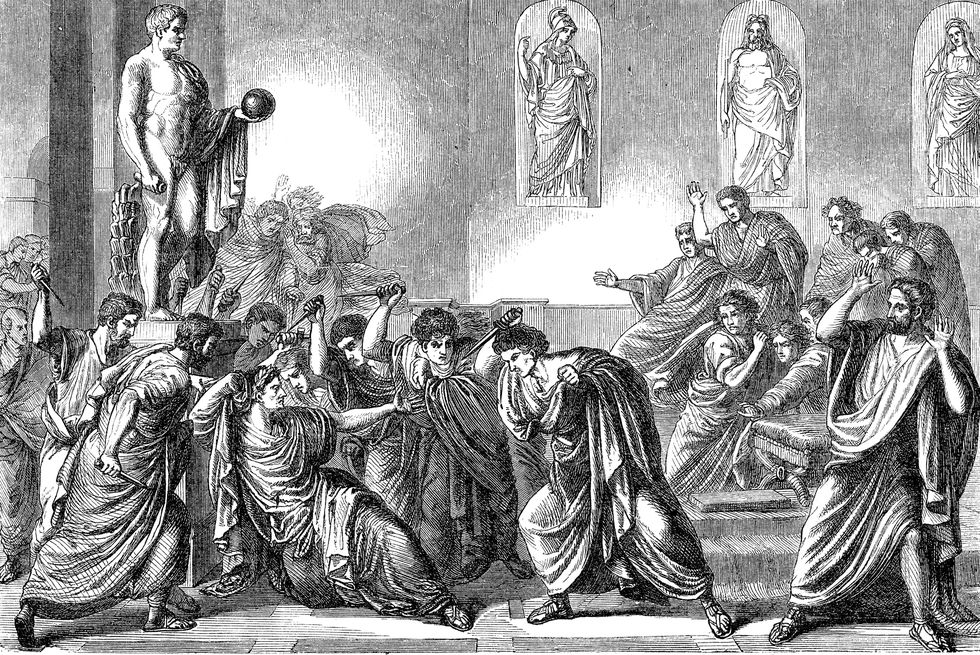
Although Caesar’s reforms greatly enhanced his standing with Rome’s lower- and middle-class populations, his increasing power was met with envy, concern, and angst in the Roman Senate. A number of politicians saw Caesar as an aspiring king.
And Romans had no desire for monarchical rule: Legend has it that it had been five centuries since they’d last allowed a king to rule them. Caesar’s inclusion of former Roman enemies in the government helped seal his downfall.
Caesar was assassinated by political rivals in Rome on the Ides of March —March 15—in 44 BCE. It’s not clear whether Caesar knew of the plot to kill him: By all accounts, he planned to leave Rome on March 18 for a military campaign in what is now modern-day Iraq, where he hoped to avenge the losses suffered by his former political ally Crassus.
Gaius Cassius Longinus and Marcus Junius Brutus , former rivals of Caesar who’d joined the Roman Senate, led Caesar’s assassination. Cassius and Brutus dubbed themselves “the liberators.”
Brutus’ involvement in the killing packed the most complicated backstory. During Rome’s earlier civil war, he had originally sided with Caesar’s opponent, Pompey. But after Caesar’s victory over Pompey, Brutus was encouraged to join the government. His mother, Servilia, was also one of Caesar’s lovers.
After his death, Caesar quickly became a martyr in the new Roman Empire. A mob of lower- and middle-class Romans gathered at Caesar’s funeral, with the angry crowd attacking the homes of Cassius and Brutus.
Just two years after his death, Caesar became the first Roman figure to be deified. The Senate also gave him the title “The Divine Julius.”
A power struggle ensued in Rome, leading to the end of the Roman Republic. Caesar’s great-grandnephew Gaius Octavian played on the late ruler’s popularity, assembling an army to fight back the military troops defending Cassius and Brutus. His victory over Caesar’s assassins allowed Octavian, who assumed the name Augustus, to take power in 27 BCE and become the first Roman emperor.
In November 2017, archaeologists announced the discovery of what they believed to be the first evidence of Caesar’s invasion of Britain in 54 BCE. The excavation of a new road in Ebbsfleet, Kent, revealed a 5-meter-wide defensive ditch and the remains of pottery and weapons. Experts from the University of Leicester and Kent County Council said the location was consistent with accounts of the invasion from the time period, and enabled them to pinpoint nearby Pegwell Bay as the likely landing spot for Caesar’s fleet.
Julius Caesar’s last days and the ensuing political clash between Octavian, Cassius, and Brutus have been famously captured in the five-act tragic play Julius Caesar by William Shakespeare . It was first produced in 1599 or 1600, around the opening of the Globe Theater, and continues to entertain audiences today. Joseph Mankiewicz ’s 1953 film adaptation of the play—starring Louis Calhern as Caesar, Marlon Brando as Mark Antony, James Mason as Brutus, and John Gielgud as Cassius—is one of the most enduring retellings on the silver screen.
- For the immortal gods are accustomed at times to grant favorable circumstances and long impunity to men whom they wish to punish for their crime, so that they may smart the more severely from a change of fortune.
- If you must break the law, do it to seize power: In all other cases, observe it.
- What we wish, we readily believe, and what we ourselves think, we imagine others think also.
- The res publica is nothing—a mere name without body or shape.
- You too, my child?
- Now that I am the leading Roman of my day, it will be harder to pull me down from first to second place than degrade me to the ranks.
- No, I am Caesar, not king.
- For those closest to a man ought not to allow his death to end their loyalty to him.
- An omen! A prodigy! Let us march where we are called by such a divine intimation. The die is cast.
- I merely want to protect myself against the slanders of my enemies.
- My aim is to outdo others in justice and equity, as I have previously striven to outdo them in achievement.
- I came, I saw, I conquered.
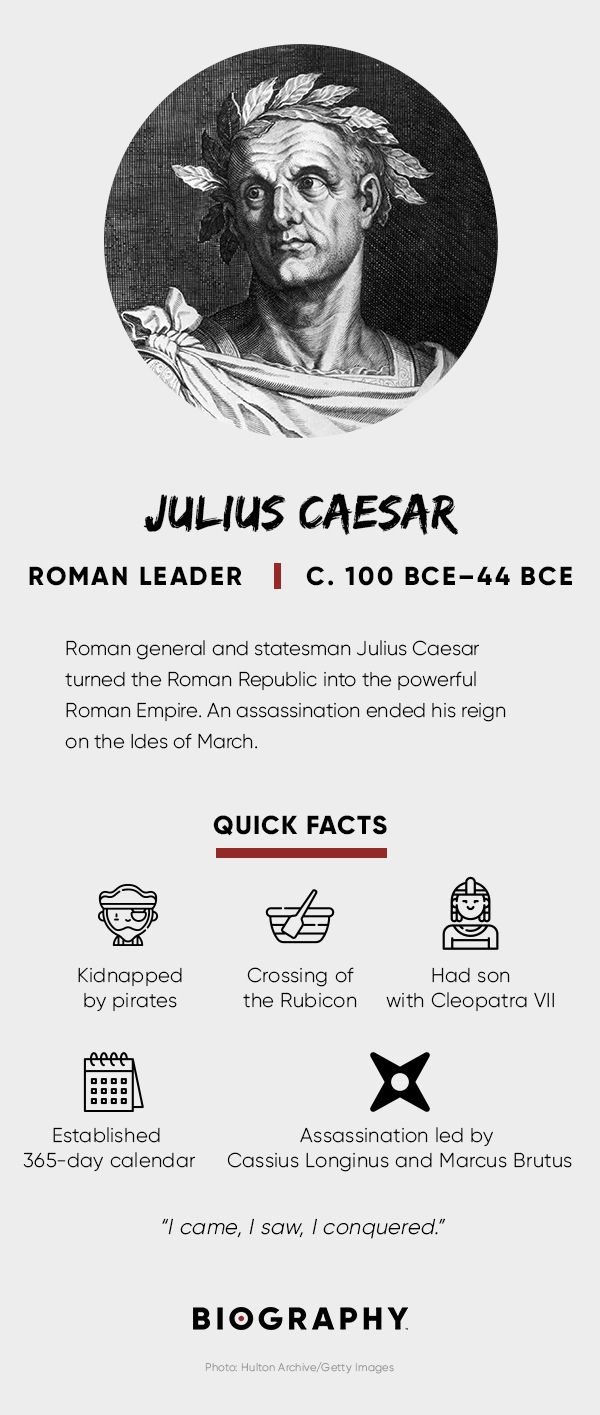
Citation Information
- Article Title : Julius Caesar Biography
- Author: Biography.com Editors
- Website Name: The Biography.com website
- URL: https://www.biography.com/political-figures/julius-caesar
- Access Date:
- Publisher: A&E; Television Networks
- Last Updated: March 15, 2023
Fact Check: We strive for accuracy and fairness. If you see something that doesn’t look right, contact us !
The Biography.com staff is a team of people-obsessed and news-hungry editors with decades of collective experience. We have worked as daily newspaper reporters, major national magazine editors, and as editors-in-chief of regional media publications. Among our ranks are book authors and award-winning journalists. Our staff also works with freelance writers, researchers, and other contributors to produce the smart, compelling profiles and articles you see on our site. To meet the team, visit our About Us page: https://www.biography.com/about/a43602329/about-us
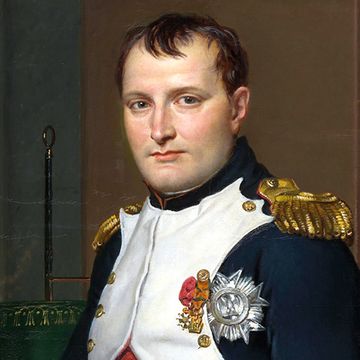
Queen Elizabeth II
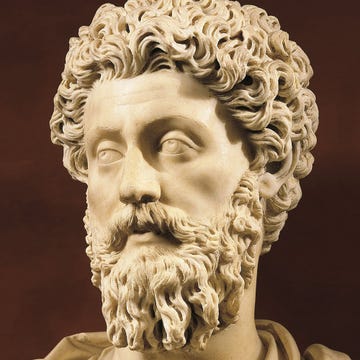
Marcus Aurelius
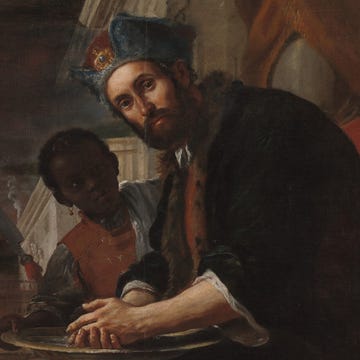
Pontius Pilate
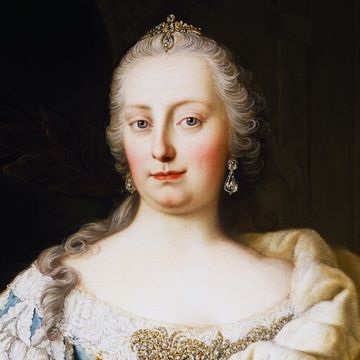
Maria Theresa
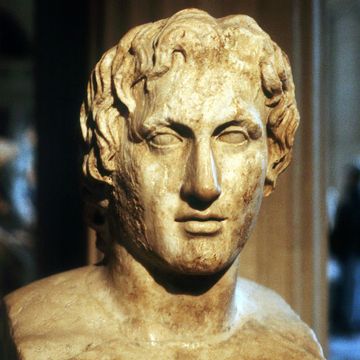
Alexander the Great
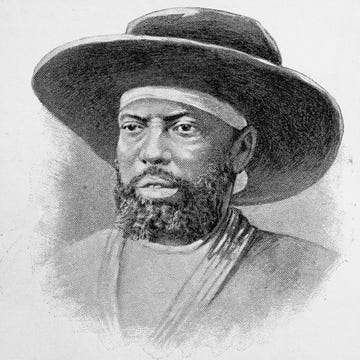
Nicholas II
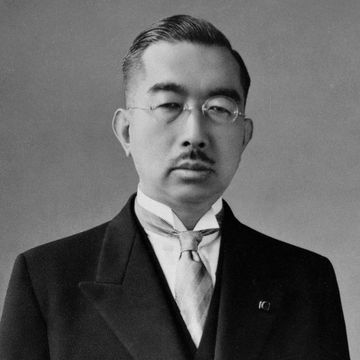
Kaiser Wilhelm
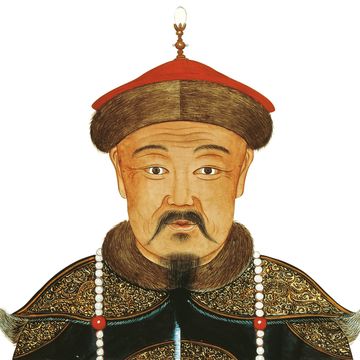
Kublai Khan
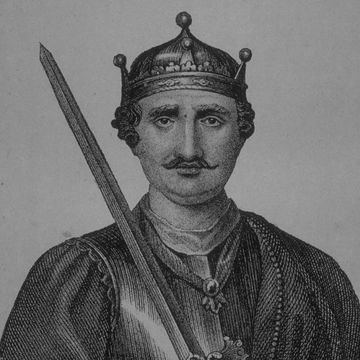
William the Conqueror

Sign Up Today
Start your 14 day free trial today
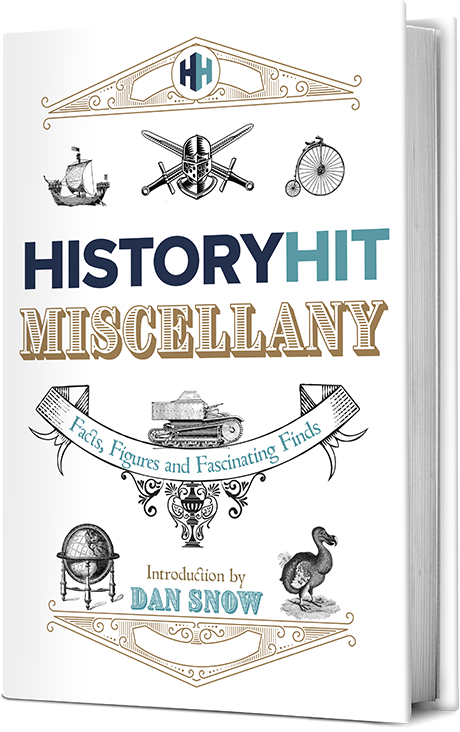
The History Hit Miscellany of Facts, Figures and Fascinating Finds
Who Was Julius Caesar? A Short Biography

Colin Ricketts
30 jul 2018.
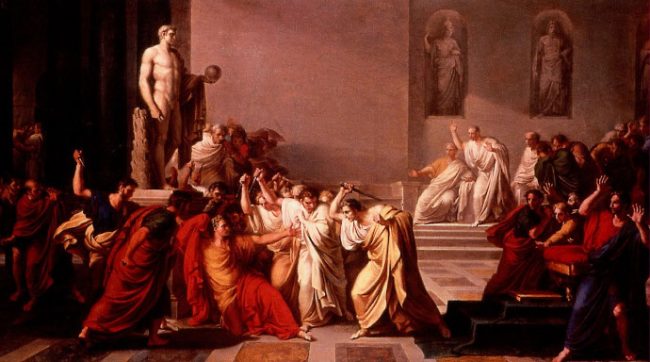
The most famous Roman of them all was never himself Emperor. But Julius Caesar’s military and political domination of Rome – as popular general, consul and finally dictator – made the switch from republican to imperial government possible.
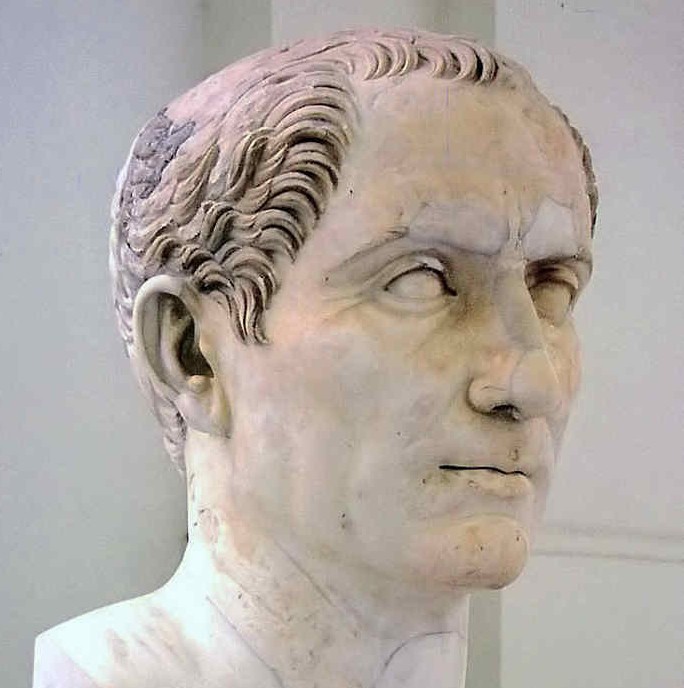
Born to power
Caesar was born into the Roman political ruling class, on 12 or 13 July 100 BC.
He was named Gaius Julius Caesar, like his father and grandfather before him. Both had been republican officials, but the Julian clan’s greatest link to high power when Julius was born was through marriage. Caesar’s paternal aunt was married to Gaius Marius, a giant of Roman life and seven times consul.
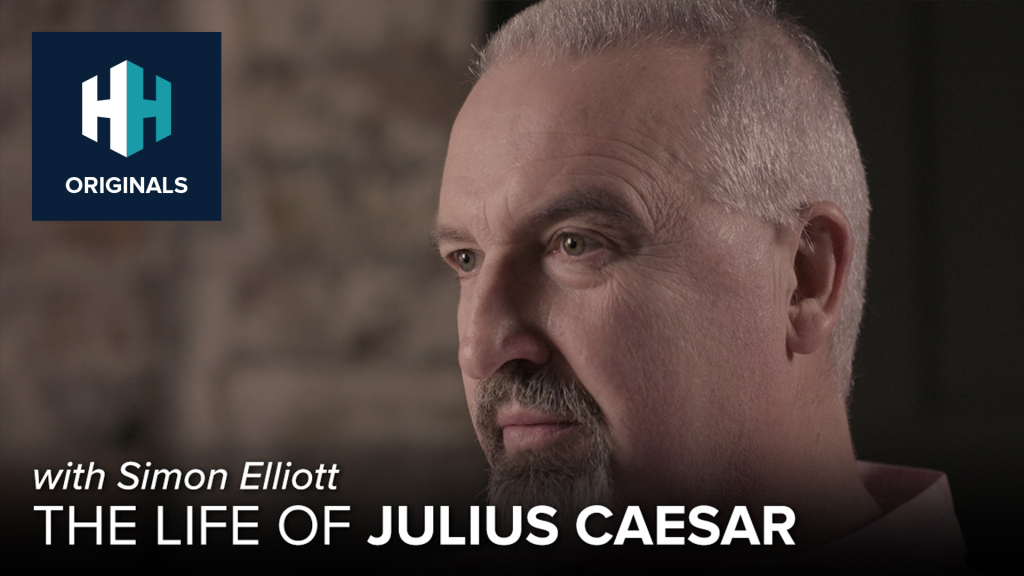
Caesar learned early that Roman politics was bloody and factional. When Gaius Marius was overthrown by the dictator Sulla, the Republic’s new ruler came after his vanquished foe’s family. Caesar lost his inheritance – he was often in debt throughout his life – and he headed for the distant safety of overseas military service.
Once Sulla had resigned power, Caesar, who had proved himself a brave and ruthless soldier, began his political climb. He moved up the bureaucratic ranks, becoming governor of part of Spain by 61-60 BC.
Conqueror of Gaul
There is a story that in Spain and aged 33, Caesar saw a statue of Alexander the Great and wept because by a younger age, Alexander had conquered a vast empire.
He made it to the top as part of a team, joining forces with the massively wealthy Crassus and the popular general Pompey to take power as the First Triumvirate, with Caesar at its head as consul.
After his term ended he was sent to Gaul. Recalling Alexander the Great, he set upon a bloody campaign of eight years of conquest, which made him fantastically wealthy and powerful. He was now a popular military hero, responsible for Rome’s long-term safety and a huge addition to its northern territory.
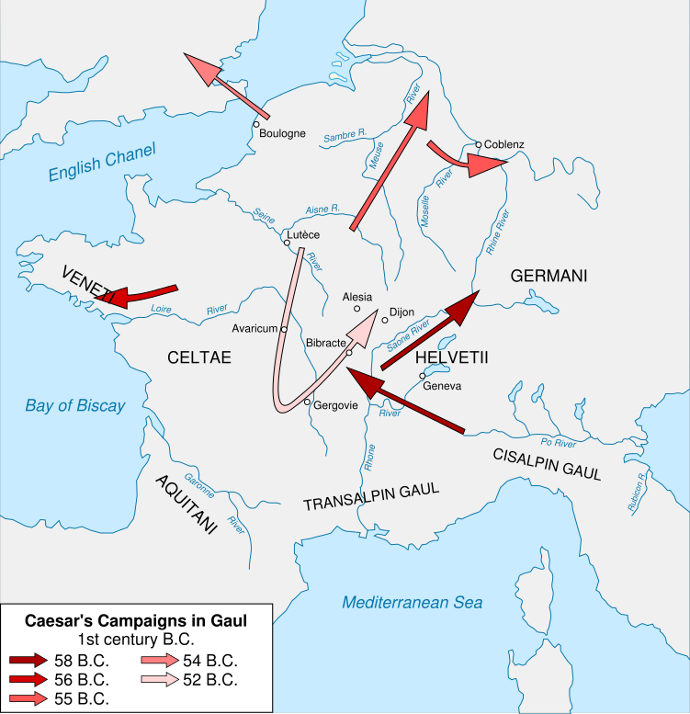
Crossing the Rubicon
Pompey was now a rival, and his faction in the senate ordered Caesar to disarm and come home. He came home, but at the head of an army, saying “let the die be cast” as he crossed the Rubicon River to pass the point of no return. The ensuing four-year civil war sprawled across Roman territory leaving Pompey dead, murdered in Egypt, and Caesar undisputed leader of Rome.
Caesar now set about putting right what he thought was wrong with a Rome that was struggling to control its provinces and was riddled with corruption. He knew that the vast territories Rome now controlled needed a strong central power, and he was it.
He reformed and strengthened the state, acted on debt and over spending and promoted child birth to build Rome’s numerical strength. Land reform particularly favoured military veterans, the backbone of Roman power. Granting citizenship in new territories unified all of the Empire’s peoples. His new Julian Calendar, based on the Egyptian solar model, lasted until the 16th century.
Caesar’s assassination and civil strife
The Roman office of dictator was meant to grant extraordinary powers to an individual for a limited period in the face of crisis. Caesar’s first political enemy, Sulla, had overstepped those bounds but Caesar went further. He was dictator for just 11 days in 49 BC, by 48 BC a new term had no limits, and in 46 BC he was given a 10-year term. One month before he was killed that was extended to life.
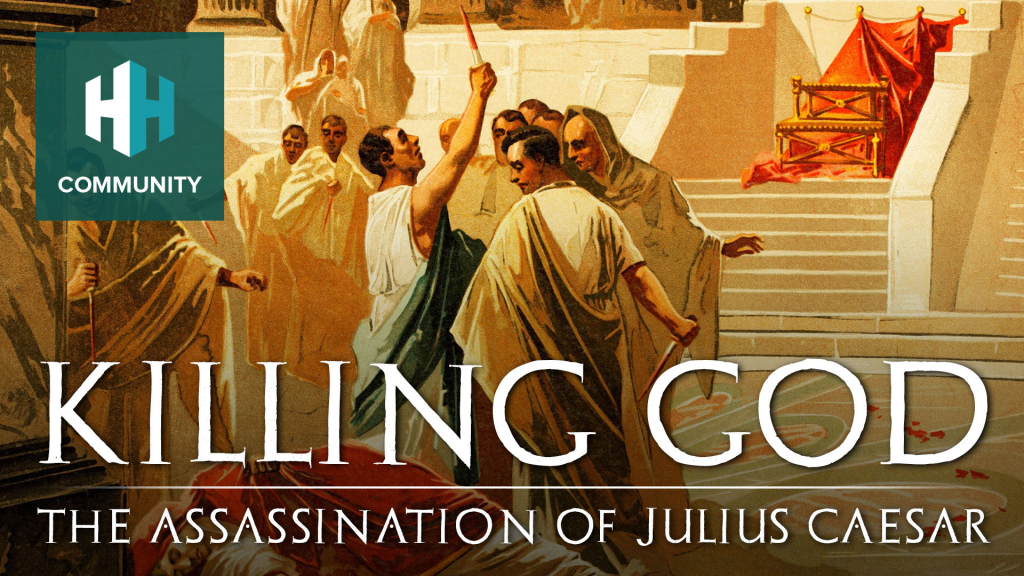
Showered with further honours and powers by the Senate, which was packed with his supporters and which in any case he could veto, there were no practical limits on Caesar’s power.
The Roman Republic had rid the city of kings yet now had one in everything but name. A conspiracy against him was soon hatched, led by Cassius and Brutus, who Caesar may have believed was his illegitimate son.
On the Ides of March (15 March) 44 BC, Caesar was stabbed to death by a group of around 60 men. The killing was announced with cries of: “People of Rome, we are once again free!” A civil war saw Caesar’s chosen successor, his great nephew Octavian, take power. Soon the republic really was over and Octavian became Augustus, the first Roman Emperor .
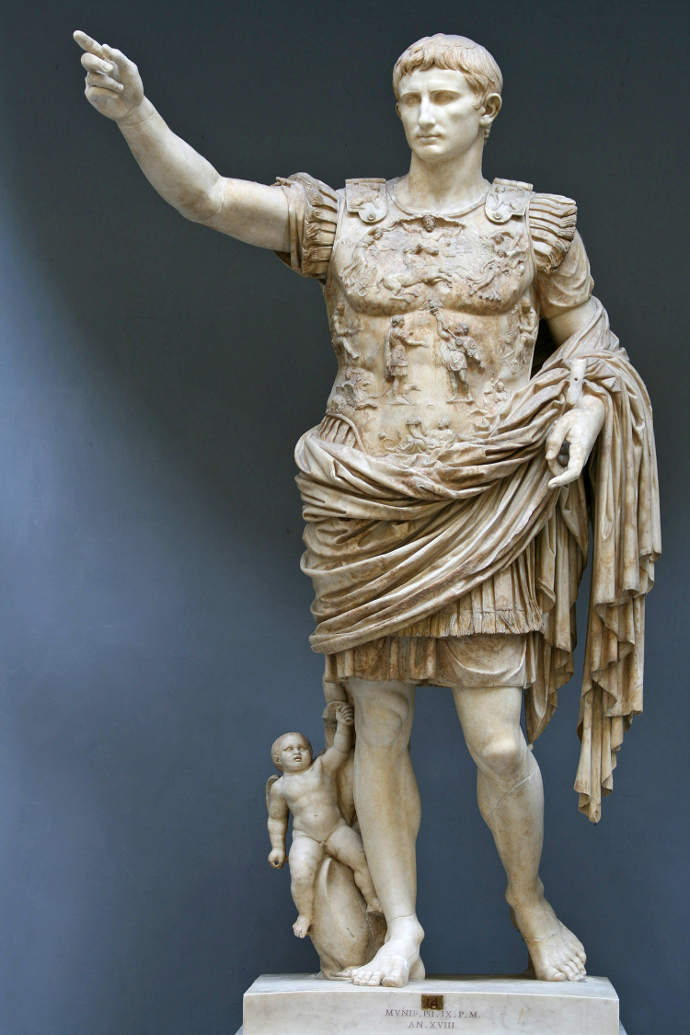
You May Also Like
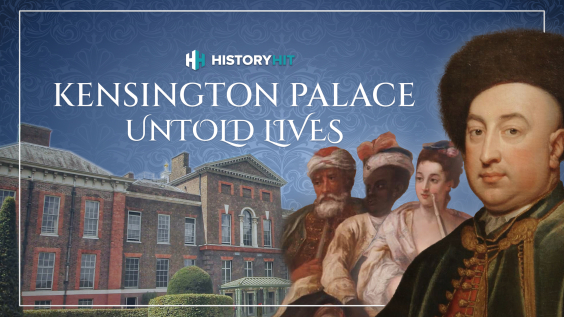
Mac and Cheese in 1736? The Stories of Kensington Palace’s Servants
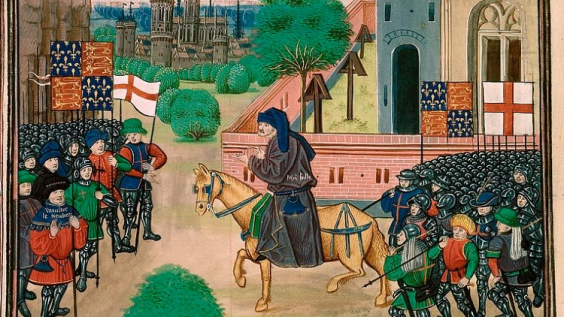
The Peasants’ Revolt: Rise of the Rebels
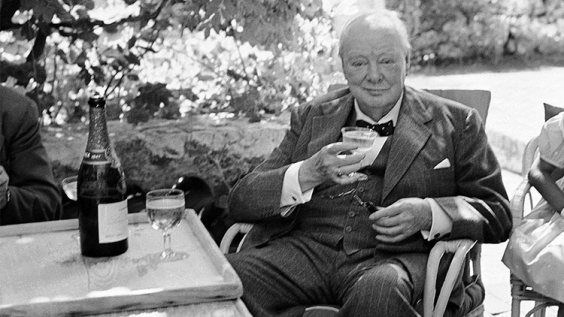
10 Myths About Winston Churchill
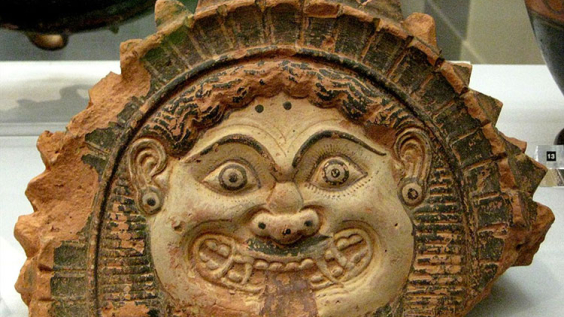
Medusa: What Was a Gorgon?
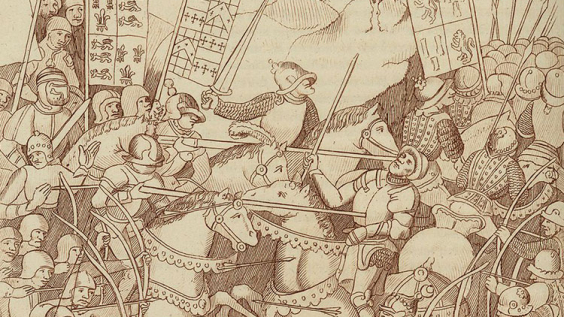
10 Facts About the Battle of Shrewsbury
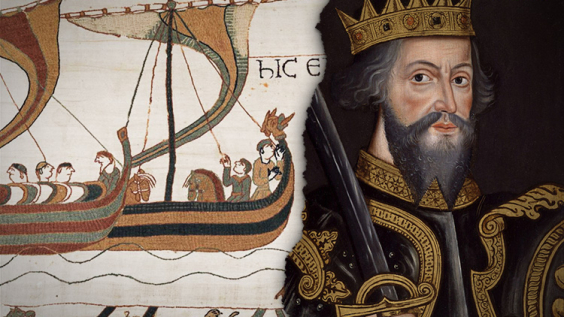
5 of Our Top Podcasts About the Norman Conquest of 1066
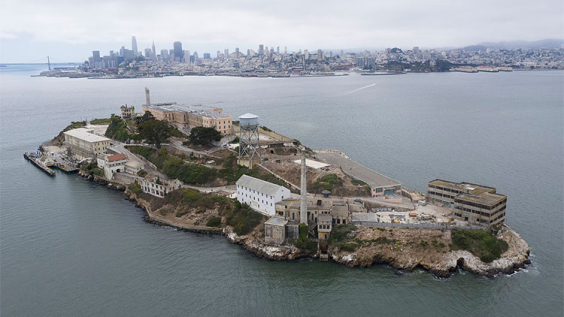
How Did 3 People Seemingly Escape From Alcatraz?
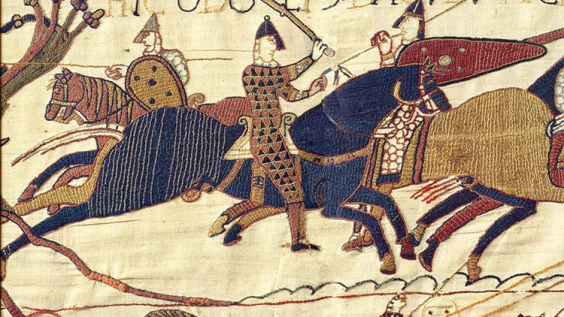
5 of Our Top Documentaries About the Norman Conquest of 1066
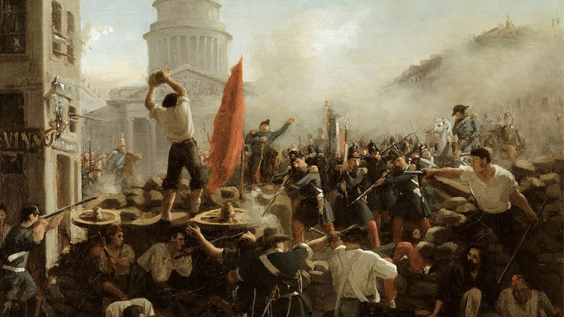
1848: The Year of Revolutions
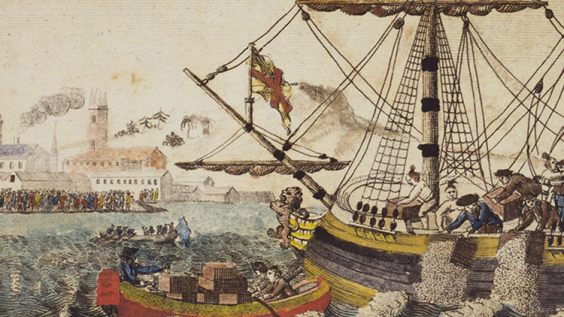
What Prompted the Boston Tea Party?

15 Quotes by Nelson Mandela

The History of Advent
ENCYCLOPEDIC ENTRY
Julius caesar.
Julius Caesar was a Roman general and politician who named himself dictator of the Roman Empire, a rule that lasted less than one year before he was famously assassinated by political rivals in 44 B.C.
Anthropology, Archaeology, Social Studies, World History
Gaius Julius Caesar was a crafty military leader who rose through the ranks of the Roman Republic, ultimately declaring himself dictator for life and shaking the foundations of Rome itself.
Photograph by James L. Stanfield, National Geographic

Julius Caesar was a Roman general and politician who named himself dictator of the Roman Empire, a rule that lasted less than one year before he was famously assassinated by political rivals in 44 B.C.E.
Caesar was born on July 12 or 13 in 100 B.C.E. to a noble family. During his youth, the Roman Republic was in chaos . Seizing the opportunity, Caesar advanced in the political system and briefly became governor of Spain, a Roman province.
Returning to Rome, he formed political alliances that helped him become governor of Gaul , an area that included what is now France and Belgium. His Roman troops conquered Gallic tribes by exploiting tribal rivalries . Throughout his eight-year governorship , he increased his military power and, more importantly, acquired plunder from Gaul . When his rivals in Rome demanded he return as a private citizen , he used these riches to support his army and marched them across the Rubicon River, crossing from Gaul into Italy. This sparked a civil war between Caesar’s forces and forces of his chief rival for power, Pompey, from which Caesar emerged victorious .
Returning to Italy, Caesar consolidated his power and made himself dictator . He wielded his power to enlarge the senate, created needed government reforms, and decreased Rome’s debt. At the same time, he sponsored the building of the Forum Iulium and rebuilt two city-states, Carthage and Corinth. He also granted citizenship to foreigners living within the Roman Republic.
In 44 B.C.E., Caesar declared himself dictator for life. His increasing power and great ambition agitated many senators who feared Caesar aspired to be king. Only a month after Caesar’s declaration, a group of senators, among them Marcus Junius Brutus, Caesar’s second choice as heir, and Gaius Cassius Longinus assassinated Caesar in fear of his absolute power.
Media Credits
The audio, illustrations, photos, and videos are credited beneath the media asset, except for promotional images, which generally link to another page that contains the media credit. The Rights Holder for media is the person or group credited.
Last Updated
October 19, 2023
User Permissions
For information on user permissions, please read our Terms of Service. If you have questions about how to cite anything on our website in your project or classroom presentation, please contact your teacher. They will best know the preferred format. When you reach out to them, you will need the page title, URL, and the date you accessed the resource.
If a media asset is downloadable, a download button appears in the corner of the media viewer. If no button appears, you cannot download or save the media.
Text on this page is printable and can be used according to our Terms of Service .
Interactives
Any interactives on this page can only be played while you are visiting our website. You cannot download interactives.
Related Resources
Biography Online

Julius Caesar Biography
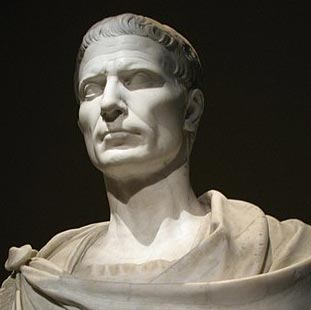
“Veni, Vidi, Vici.” “I came, I saw, I conquered.”
– Julius Caesar
Gaius Julius Caesar was born into a noble family with a long pedigree of serving the Roman Republic. He gained a good education, but when he was 16 his father died, and it left Caesar in a difficult position due to an ongoing civil war which made his family a target. His inheritance was stripped from Caesar, leaving him with little money. He worked as an advocate and became known for his powerful oratory.

Surrender of Gallic chieftains after the Battle of Alesia (52 BC)
In 59 BC, Caesar was elected Consul to the Roman Senate, where he proposed a law to redistribute lands to the poor. However, this was opposed by many other senators. Instead, he was given command over Roman armies in northern Italy, southern France and southeastern Europe. Over the next seven years, Caesar led his armies to conquer large areas of Europe. It included modern-day France, Switzerland, Belgium, Germany and as far north as Britain. Despite, facing forces with greater numbers of men, the superior military capabilities and tactics of the Romans enabled Caesar to make a dramatic expansion of the Roman Empire. The historian Plutarch claimed that Caesar’s army fought over 3 million men, of which 1 million were killed, and approximately 800 cities were destroyed in the campaign. He is widely regarded as a pre-eminent military genius.
Caesar’s exploits made him popular with his soldiers and ordinary people back in Rome. However, his popularity only made his political enemies more nervous about Caesar and in 50 BC the Senate, led by Pompey, ordered Caesar to disband his army and return to Rome. Caesar had good reason to fear he would be tried and executed, but with the support of his soldiers and public opinion, he ignored the summons and returned to Rome with his army in tow. On 10 January 49 BC, he crossed the Rubicon river with one legion. As he crossed the river, he is said to have remarked. “The die is cast.”
Caesar then pursued and defeated armies loyal to Pompey. This allowed him to return in triumph to Rome, where he was re-elected to a second consulship.
Caesar pursued Pompey to Egypt, where Pompey was killed and Caesar formed an alliance with Cleopatra in an Egyptian civil war. With Caesar’s help, Cleopatra emerged victorious and she was installed as ruler of Egypt. Caesar and Cleopatra had an affair and produced a son Caesarian out of wedlock. Cleopatra visited Caesar in Rome.
Caesar gradually increased his power until he was proclaimed dictator for life. At the time, the Roman Empire was beset with corruption, fratricidal conflict and gross inequality. Caesar saw that Republican government was not working and he felt the only way to restore strong, stable government was through centralisation of power and authority in a strong leader. Although Caesar defeated supporters of Pompey in conflict, he was not as ruthless with political opponents as he might have done. He created many new loyal senators, but some old aristocratic senators remained.
As leader, Caesar tried to introduce many reforms into the Roman Empire, such as introducing a new calendar based on the Egyptian model of the sun, rather than the old system based on the moon. The Julian calendar began on 1 January 45 BC and is the basis for the modern western calendar. He also passed laws to redistribute power and wealth towards a greater section of society. He also sought to bring the Italian provinces into a more cohesive national unit. Caesar offered Roman citizenship to a greater scope of people. He published coins with his own image on. Despite ambitious plans to create a new constitution, he never enacted it.
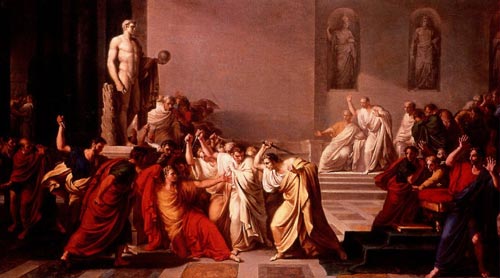
The murder of Caesar
Despite Caesar’s power and popularity with the public, Senators were concerned that Caesar was heading towards a totalitarian state where the Senate would be completely abolished and they would lose increasing amounts of wealth and land due to Caesar’s policy of redistribution. Meeting in secret, senators, such as Gaius Cassius Longinus, Decimus Junius Brutus Albinus, and Marcus Junius Brutus decided to murder Caesar while he was in the Senate as only senators were allowed there.
In the days leading up to the assassination, Caesar had received warnings his life was in danger, but in keeping with his personal outlook on life, he dismissed threats of his personal safety and ignored any extra measures for safety.
On 15 March 44 BC, the senators hid knives in their cloaks and then attacked Caesar on the steps of the Senate. His final words are disputed, but Caesar is said to have expressed surprise the senators turned on him. In his famous play, Shakespeare offered a fictional account with the famed words “Et Tu Brutus, then fall Caesar” Caesar died from multiple knife wounds.
In the aftermath of Caesar’s death, the Roman republic hastened to its demise – contrary to the aims of the conspirators. There was widespread mourning amongst the poorer sections of society for the loss of Caesar and the conspirators fled. Caesar had named his adoptive son Octavian as his heir. This led to a civil war between Mark Anthony and Octavian for control. Octavian prevailed and took the name, Caesar Augustus. Augustus went on to complete many of his father’s plans.
Julius Caesar became a powerful symbol of earthly power. He was by all accounts a charismatic figure, brilliant orator, powerful writer and someone who connected with ordinary people. He has a supreme self-confidence in his own abilities. His life and attitude is often summed up in his own words:
Veni, Vidi, Vici. “I came, I saw, I conquered.”
Caesar became a title imbued with almost god-like significance. The German Kaiser and Tzar in Russia are derived from Caesar.
He married three times. Cornelia (84–69 BC; her death) Pompeia (67–61 BC; divorced) Calpurnia (59–44 BC; his death) He only had one child born in wedlock – Julia with his first wife Cornelia. Julia was renowned for her beauty and virtue.
Citation: Pettinger, Tejvan. “ Biography of Julius Caesar” , Oxford, UK www.biographyonline.net , Published: 22 June 2019.

Caesar – by Adrian Goldsworthy (Authat Amazon
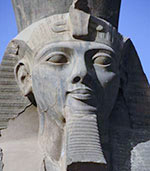
Culture History
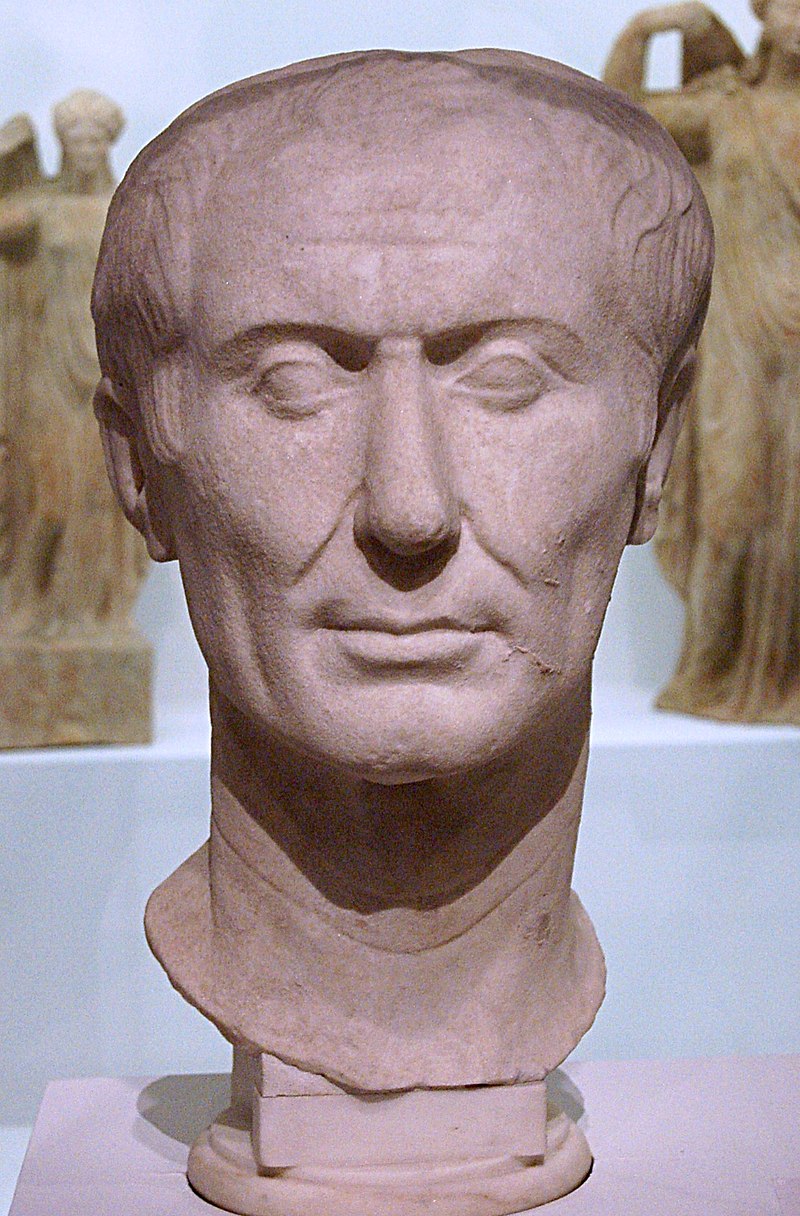
Julius Caesar
Julius Caesar was a Roman military general, statesman, and dictator who played a critical role in the events that led to the demise of the Roman Republic and the rise of the Roman Empire. He was born in 100 BCE and was assassinated in 44 BCE. Caesar’s military conquests, political maneuvers, and eventual dictatorship significantly impacted the course of Roman history.
Early Life and Rise to Power
Julius Caesar’s early life and rise to power are integral parts of his historical narrative, shaping the trajectory of his political and military career. Born into a patrician family on July 12 or 13, 100 BCE, in Rome, Caesar hailed from a line that claimed descent from the goddess Venus. His family lacked the immense wealth of some Roman nobility, but they were well-connected politically.
Caesar’s father died when he was 16, leaving him with the responsibility of heading the family. Despite his father’s demise, Caesar received an excellent education, studying rhetoric, literature, and philosophy in Rome and Rhodes. His eloquence and oratorical skills, evident later in his political career, were honed during these formative years.
Caesar’s entry into public life began with his election as military tribune in 72 BCE. This position marked the start of his military service and provided him with the opportunity to showcase his leadership abilities. Subsequently, he served as quaestor in Hispania (present-day Spain) in 69 BCE, where he displayed administrative competence, albeit facing financial challenges. This early experience in both military and administrative roles laid the groundwork for his later achievements.
The turning point in Caesar’s career occurred when he formed a political alliance with two influential figures, Pompey and Crassus, creating the First Triumvirate in 60 BCE. Although an informal coalition rather than a legally sanctioned entity, the Triumvirate allowed the trio to pool their resources and influence Roman politics. Caesar’s alliance with Pompey, a military hero, and Crassus, one of the wealthiest Romans, bolstered his own political and military standing.
In 59 BCE, Caesar secured the powerful position of consul through the Triumvirate’s influence. His consulship marked a critical phase in his rise to power, as he navigated the complexities of Roman politics and consolidated support among the Roman populace. During his term, he pushed through legislation that addressed the land distribution issue, providing veterans with plots of land—a move that endeared him to the common people and strengthened his political base.
Caesar’s next significant step was obtaining the proconsulship of Gaul in 58 BCE. This appointment, which granted him command over Roman legions in Gaul (modern-day France, Belgium, and parts of Switzerland), was crucial for both military and political reasons. While Gaul was perceived as a province that required Roman control, it also provided Caesar with the opportunity to amass wealth and military glory.
Over the course of nearly a decade, from 58 BCE to 50 BCE, Caesar conducted a series of military campaigns in Gaul. His achievements in these campaigns showcased his strategic brilliance, tactical innovation, and an innate understanding of military logistics. The conquest of Gaul not only expanded Rome’s territories but also solidified Caesar’s reputation as a military genius.
Caesar’s Commentarii de Bello Gallico, his firsthand account of the Gallic Wars, demonstrates his prowess not only as a military commander but also as a skilled writer. The Commentarii served a dual purpose: narrating his military exploits for a Roman audience hungry for glory and shaping his own public image. Through these writings, Caesar skillfully portrayed himself as a capable and magnanimous leader, endearing himself to the Roman people.
While Caesar was achieving military success in Gaul, political tensions were escalating in Rome. His prolonged absence and accumulating power fueled suspicions among the Roman elite, particularly in the Senate. The triumviral arrangement with Pompey and Crassus began to unravel as Pompey aligned himself more closely with the Senate, distancing himself from Caesar.
The Senate, fearing Caesar’s growing influence and popularity, demanded that he disband his legions and return to Rome without the prospect of standing for consulship in absentia. However, Caesar was hesitant to comply, aware that returning to Rome without the protection of his armies could expose him to political and legal vulnerabilities.
The Rubicon River, a small waterway separating Gaul from Italy, became the symbolic threshold of Caesar’s defiance. Crossing the Rubicon in 49 BCE, Caesar uttered the famous phrase “alea iacta est” (“the die is cast”), signaling his decision to march on Rome and plunge the Republic into a civil war.
The ensuing conflict, known as the Roman Civil War, pitted Caesar against Pompey and the Senate. The decisive Battle of Pharsalus in 48 BCE resulted in Caesar’s victory, solidifying his control over the Roman state. Pompey fled to Egypt, where he was assassinated, and Caesar pursued his political adversaries, asserting dominance over Rome.
Upon returning to Rome, Caesar faced the challenge of consolidating power and implementing his vision for the Roman state. He embarked on a series of political and social reforms, aiming to address long-standing issues within Roman society. These reforms included the redistribution of land to veterans, the extension of Roman citizenship to more individuals, and the restructuring of the calendar into the Julian calendar.
Caesar’s political maneuvers, while applauded by the common people, stirred apprehension among those who cherished the traditional republican values. The Senate, fearing the concentration of power in one individual, grew increasingly uneasy. The culmination of these tensions unfolded on the Ides of March, March 15, 44 BCE, when a group of senators, including prominent figures like Brutus and Cassius, assassinated Caesar in the Theatre of Pompey.
Julius Caesar’s early life and rise to power reflect a complex interplay of political astuteness, military prowess, and the shifting dynamics of Roman society. From his humble beginnings to his triumphs in Gaul and the subsequent civil war, Caesar’s journey laid the groundwork for the transformation of the Roman Republic into the Roman Empire . His legacy, marked by both admiration and controversy, remains a pivotal chapter in the annals of Western history.
Military Campaigns
Julius Caesar’s military campaigns stand as a testament to his strategic brilliance, bold leadership, and unparalleled military acumen. The most renowned of these campaigns occurred in Gaul, spanning from 58 BCE to 50 BCE, and were chronicled in Caesar’s own writings, Commentarii de Bello Gallico (Commentaries on the Gallic War).
Caesar’s proconsulship in Gaul marked a turning point in his career. Initially, his assignment seemed routine, involving the pacification of a region that had seen frequent uprisings. However, the scale and intensity of his campaigns surpassed expectations, and his accomplishments in Gaul became the cornerstone of his military reputation.
The Gallic Wars commenced with Caesar’s intervention in the Helvetii migration in 58 BCE. The Helvetii, a Celtic tribe, sought to migrate westward, causing concern among Roman allies. Caesar, viewing their movement as a potential threat to Roman stability, decisively defeated them at the Battle of Bibracte, showcasing his strategic foresight and military prowess.
Caesar’s campaigns in Gaul were marked by a series of engagements against various Gallic tribes, each presenting unique challenges. The Battle of Gergovia in 52 BCE, against the ambitious chieftain Vercingetorix, demonstrated Caesar’s adaptability and resilience. Though Caesar faced setbacks in this campaign, including a failed siege and a retreat, he ultimately regrouped and emerged victorious in the Siege of Alesia, effectively quelling the Gallic resistance.
A significant aspect of Caesar’s success in Gaul was his ability to forge alliances and divisions among the Gallic tribes. His diplomatic skill, coupled with a thorough understanding of local politics, allowed him to exploit internal rivalries and weaken Gallic unity. This divide-and-conquer strategy played a pivotal role in securing Roman dominance.
The Battle of Alesia, fought in 52 BCE, was a masterstroke in military strategy. Vercingetorix, recognizing the impending Roman siege, gathered Gallic forces in a fortified position. Caesar, undeterred, surrounded Alesia with a double fortification—a circumvallation to repel external reinforcements and a contravallation to defend against potential counterattacks. The Roman legions endured harsh conditions but ultimately prevailed, showcasing Caesar’s logistical prowess and strategic vision.
As Caesar continued to subjugate Gaul, his military campaigns extended beyond the borders of modern France. In 55 BCE and 54 BCE, he conducted two expeditions to Britain, seeking to expand Roman influence and gather intelligence. While the expeditions did not result in permanent conquests, they demonstrated Caesar’s audacity and willingness to explore new frontiers.
The Battle of Pharsalus in 48 BCE marked a critical juncture in Caesar’s military career. Facing off against Pompey, his former ally turned adversary, Caesar employed tactical brilliance to secure victory. Despite being outnumbered, Caesar exploited weaknesses in Pompey’s strategy, decisively defeating him. The Battle of Pharsalus solidified Caesar’s control over the Roman state, making him the undisputed master of Rome.
The Egyptian Campaign in 47 BCE showcased Caesar’s military prowess and political acumen. Following the Battle of Pharsalus, Caesar pursued Pompey to Egypt, where he became embroiled in the Egyptian civil war between Cleopatra and her brother Ptolemy XIII. Caesar intervened decisively, aligning with Cleopatra and ensuring her ascent to the throne. This strategic move not only secured an alliance with Egypt but also showcased Caesar’s ability to navigate complex political landscapes.
Caesar’s military campaigns were characterized by a combination of strategic brilliance, tactical innovation, and adaptability. His legions, known for their discipline and loyalty, formed the backbone of his military success. Caesar’s personal leadership style, characterized by hands-on involvement in battles and the welfare of his troops, earned him the unwavering loyalty of his legions.
The Siege of Uxellodunum in 51 BCE, toward the end of the Gallic Wars, further demonstrated Caesar’s tenacity. The fortress of Uxellodunum, held by Gallic rebels, withstood a prolonged Roman siege. However, Caesar, determined to break the resistance, implemented a ruthless strategy. Upon capturing the stronghold, he imposed harsh penalties on the defenders, including cutting off the hands of those who had borne arms—an act that exemplified his resolve in maintaining Roman authority.
The military campaigns of Julius Caesar, while securing his position as a legendary commander, also raised concerns among the Roman elite. The prolonged duration of his proconsulship, coupled with his military successes, fueled fears of his growing power and ambitions. The crossing of the Rubicon River in 49 BCE, signaling the beginning of the Roman Civil War, marked a point of no return and set the stage for the eventual demise of the Roman Republic.
First Triumvirate
The First Triumvirate, a political alliance formed in 60 BCE, played a pivotal role in shaping the course of Roman history, paving the way for the rise of Julius Caesar and the eventual transition from the Roman Republic to the Roman Empire. Comprising three influential figures—Julius Caesar, Gnaeus Pompeius Magnus (Pompey), and Marcus Licinius Crassus—the Triumvirate represented a strategic coalition of military prowess, political maneuvering, and financial influence.
Julius Caesar, a rising political figure known for his military exploits and charisma, formed a crucial part of the Triumvirate. Born into a patrician family, Caesar’s early political career saw him ascending through the Roman offices, showcasing his abilities as both a military commander and a shrewd politician. By aligning with Pompey and Crassus, Caesar sought to consolidate power and navigate the intricate political landscape of the late Roman Republic.
Pompey, also known as Pompey the Great, was a celebrated military general who had achieved fame through his victories in the East. Having been a part of the First Triumvirate, Pompey’s alliance with Caesar marked a notable shift in Roman politics. Initially, Pompey’s military prowess and popularity garnered him significant influence, but he found himself increasingly at odds with the Senate. The Triumvirate provided him with a powerful alliance to counterbalance the Senate’s influence and safeguard his interests.
Crassus, the wealthiest man in Rome at the time, was a seasoned politician and military commander. His financial resources were crucial in supporting the political aspirations of both Caesar and Pompey. Despite his wealth, Crassus sought military glory to match his political standing, and the Triumvirate offered him an opportunity to pursue his ambitions. Together, the three men formed a formidable trio that could effectively challenge the traditional power structures within the Roman Republic.
The formation of the Triumvirate was facilitated by mutual interests and complementary strengths. Caesar, as consul in 59 BCE, played a key role in brokering the alliance. The political landscape at the time was fraught with tensions, with various factions vying for control. Caesar’s consulship allowed him to shape the political climate in favor of the Triumvirate.
One of the earliest manifestations of the Triumvirate’s power was the passing of legislation known as the Lex Julia, which addressed the distribution of land to Pompey’s veterans and provided support for Caesar’s legislative agenda. This marked the beginning of the Triumvirate’s collaborative efforts in pursuing their individual goals while collectively challenging the Senate’s authority.
To solidify their alliance, Caesar gave his daughter Julia in marriage to Pompey, creating a familial tie between the two leaders. This marital connection was intended to strengthen the bonds of the Triumvirate, emphasizing the personal relationships that underpinned its political cohesion.
Despite the appearance of unity, tensions within the Triumvirate began to surface. The death of Julia in 54 BCE dealt a significant blow to the personal ties between Caesar and Pompey. Without this familial link, the Triumvirate faced strains as personal ambitions and conflicting interests took precedence.
Crassus’s death in 53 BCE further destabilized the alliance. His defeat at the Battle of Carrhae against the Parthians marked the end of his military aspirations and left a power vacuum within the Triumvirate. With Crassus gone, the delicate balance of power tilted, setting the stage for the eventual rivalry between Caesar and Pompey.
The breakdown of the Triumvirate became evident as Caesar’s proconsulship in Gaul drew to a close. The Senate, sensing an opportunity to curb Caesar’s influence, sought to limit his power upon his return to Rome. Pompey, once Caesar’s ally, found himself torn between loyalty to the Senate and maintaining a semblance of alliance with Caesar.
The situation reached a critical juncture in 50 BCE when the Senate demanded that Caesar disband his legions and return to Rome without the prospect of standing for consulship in absentia. Caesar, reluctant to expose himself to political vulnerability, chose to defy the Senate’s orders. Crossing the Rubicon River in 49 BCE, he famously declared, “alea iacta est” (“the die is cast”), initiating a civil war that would determine the fate of the Roman Republic.
The ensuing conflict, known as the Roman Civil War, pitted Caesar against Pompey and the Senate. Despite the historical camaraderie between Caesar and Pompey, the breakdown of the Triumvirate led to a bitter rivalry. The decisive Battle of Pharsalus in 48 BCE resulted in Caesar’s victory, marking a turning point in Roman history.
Pompey fled to Egypt, where he was ultimately assassinated. Caesar, upon arriving in Egypt, became embroiled in the Egyptian civil war between Cleopatra and her brother Ptolemy XIII. His intervention on Cleopatra’s behalf further showcased the intersection of political and military dynamics in the wake of the Triumvirate’s dissolution.
The legacy of the First Triumvirate lies in its role as a catalyst for the unraveling of the Roman Republic. While the alliance initially served the interests of its members, personal ambitions, conflicting goals, and external pressures led to its disintegration. The breakdown of the Triumvirate set the stage for the rise of Julius Caesar and the subsequent shift from republic to empire, marking a transformative period in Roman history.
Crossing the Rubicon
The crossing of the Rubicon River by Julius Caesar in 49 BCE is a historic event that reverberated through the annals of Roman history, signaling the beginning of a civil war and ultimately leading to the demise of the Roman Republic. This fateful decision, immortalized by the phrase “alea iacta est” (“the die is cast”), marked a point of no return and set in motion a series of events that would reshape the political landscape of ancient Rome .
The Rubicon River served as a natural boundary between Cisalpine Gaul, where Julius Caesar held command, and the Roman Republic proper. Roman law strictly forbade any general from bringing an army across this river and into the Italian peninsula. This prohibition was designed to prevent military leaders from using their legions to seize power within Rome. The crossing of the Rubicon was, therefore, a direct challenge to the authority of the Roman Senate.
The events leading to Caesar’s decision to cross the Rubicon were rooted in the complex political dynamics of the time. The First Triumvirate, a political alliance formed in 60 BCE between Caesar, Pompey, and Crassus, had begun to unravel. The death of Crassus in 53 BCE created a power vacuum, and the subsequent death of Pompey’s wife, Julia (Caesar’s daughter), severed one of the personal ties that had bound the triumvirs together.
As Caesar’s proconsulship in Gaul neared its end in 50 BCE, the Senate, led by Pompey and his allies, sought to curtail Caesar’s influence upon his return to Rome. The Senate demanded that Caesar disband his legions and return to Rome without standing for consulship in absentia. This move was a calculated attempt to weaken Caesar’s political standing and prevent him from leveraging his military success in Gaul for further political gains.
Caesar, aware of the potential consequences of yielding to the Senate’s demands, faced a dilemma. Returning to Rome without the protection of his legions could expose him to political and legal vulnerabilities. The Senate, dominated by Pompey’s faction, had already demonstrated its intent to curb Caesar’s influence. The alternative, however, meant defying Roman law and initiating a civil war.
On January 10, 49 BCE, Caesar stood on the northern bank of the Rubicon with his legions. The Rubicon was not just a physical barrier; it represented the legal limit to a general’s authority. Caesar, contemplating the gravity of his decision, knew that crossing the Rubicon would trigger a conflict with the Senate, possibly leading to a civil war. The phrase “alea iacta est” is attributed to Caesar at this moment, signifying his acceptance of the irreversible course of action.
Caesar’s decision to cross the Rubicon was marked by both audacity and strategic calculation. Crossing the river with his army meant violating Roman law, an act that would bring about severe consequences. It was a move that would either secure his political survival or lead to his downfall. The die was cast, and there was no turning back.
The crossing of the Rubicon set off a chain reaction of events that unfolded rapidly. Caesar moved swiftly towards Rome, facing minimal resistance as many cities, including Ariminum and Rimini, opened their gates to him. The Senate, caught off guard, scrambled to respond to the sudden and bold advance of Caesar’s forces.
Pompey, realizing the gravity of the situation, opted to abandon Rome and retreat to the south. He hoped to gather forces, consolidate support, and prepare for a confrontation with Caesar. The strategic maneuvering on both sides marked the beginning of the Roman Civil War, a conflict that would determine the fate of the Roman Republic.
Caesar’s march towards Rome was marked by a series of decisive actions, including the capture of key cities and the securing of strategic alliances. The speed and efficiency of his movements showcased not only the loyalty of his legions but also the effectiveness of his military strategy.
The Battle of Pharsalus in 48 BCE was the climactic encounter of the Roman Civil War. It pitted Caesar against Pompey in a showdown that would decide the fate of the Republic. Despite being outnumbered, Caesar’s tactical brilliance and the discipline of his legions prevailed. The defeat of Pompey marked a turning point in Roman history, solidifying Caesar’s control over Rome.
The consequences of crossing the Rubicon were profound and far-reaching. By challenging the Senate’s authority, Caesar effectively ended the Roman Republic’s tradition of peaceful transitions of power. The political norms that had guided Rome for centuries were shattered, and the stage was set for the rise of autocratic rule.
Caesar’s crossing of the Rubicon and the subsequent civil war led to a series of political and institutional changes. Caesar was appointed dictator perpetuo (dictator in perpetuity), consolidating unprecedented power in his hands. The Senate, stripped of its authority, became a symbolic body with limited influence. Caesar’s reforms, including the restructuring of the calendar into the Julian calendar, further reflected his imprint on Roman governance.
The crossing of the Rubicon and the events that followed culminated in the assassination of Julius Caesar on the Ides of March in 44 BCE. While Caesar’s actions had transformed the political landscape, his death sparked new conflicts and power struggles. The vacuum left by Caesar’s demise ultimately paved the way for the rise of Caesar’s adopted heir, Octavian (later known as Augustus), and the establishment of the Roman Empire.
Dictatorship
Julius Caesar’s ascent to dictatorship marked a transformative period in Roman history, profoundly altering the political landscape and leading to the demise of the Roman Republic. From his crossing of the Rubicon in 49 BCE to his assassination on the Ides of March in 44 BCE, Caesar’s dictatorial rule left an indelible impact on Rome and set the stage for the subsequent transition from republic to empire.
Caesar’s appointment as dictator perpetuo (dictator in perpetuity) was a culmination of a series of events that unfolded during the Roman Civil War. The conflict emerged from the breakdown of the First Triumvirate, the political alliance between Caesar, Pompey, and Crassus. With Crassus dead and Pompey aligning himself with the Senate, Caesar found himself at odds with the Roman political establishment.
The crossing of the Rubicon in 49 BCE was a decisive move that set the Roman Civil War into motion. Caesar, aware of the political risks, defied the Senate’s orders and marched his legions into Italy. The ensuing conflict saw decisive battles, including the Battle of Pharsalus in 48 BCE, where Caesar emerged victorious, securing control over Rome.
Caesar’s rise to dictatorship was facilitated by the breakdown of traditional Roman political norms. The Senate, once the primary governing body, found itself weakened and unable to resist Caesar’s growing power. The dictator perpetuo title, bestowed upon Caesar by the Senate in 44 BCE, granted him unprecedented authority, effectively making him the sole ruler of Rome.
As dictator, Caesar implemented a series of reforms aimed at addressing social and political issues within the Roman Republic. His policies reflected a blend of pragmatism and a desire for populist support. One significant reform was the distribution of land to veterans, a move intended to reward his loyal soldiers and alleviate social tensions in Rome.
Caesar’s agrarian reforms aimed at providing land to the poor, particularly those who had served in his legions during the Gallic Wars. This measure not only helped secure the loyalty of his veteran soldiers but also endeared him to the urban poor, a significant constituency in Roman politics. By addressing issues of land distribution, Caesar sought to strengthen his support base and foster social stability.
In addition to domestic reforms, Caesar initiated changes to the Roman calendar, which resulted in the adoption of the Julian calendar. This calendar, named after Caesar, introduced a 365-day year with a leap year, aligning more closely with the solar year. The Julian calendar, with later adjustments, formed the basis for the modern Gregorian calendar.
While Caesar’s reforms addressed immediate concerns and garnered support from certain segments of society, they also raised concerns among those who cherished the traditional republican values. The concentration of power in the hands of a single individual contradicted the foundational principles of the Roman Republic, where power was meant to be distributed among elected officials.
The Senate, despite its diminished influence, remained a symbol of republican governance. The traditionalists within the Senate feared Caesar’s autocratic rule and resented the erosion of their authority. Tensions between Caesar and the Senate persisted, as exemplified by incidents like the infamous refusal to rise in his honor and the offer of a crown during the Lupercalia festival, which Caesar rejected to avoid the appearance of aspiring to kingship.
Caesar’s refusal to accept the crown at the Lupercalia festival demonstrated his awareness of the sensitivities surrounding monarchical symbols in Rome. Despite his dictatorial powers, Caesar was mindful of the need to maintain a facade of republican governance to appease those who still clung to the ideals of the Roman Republic.
The term “dictator perpetuo” itself reflected a delicate balance. While the title conferred immense power upon Caesar, it retained a semblance of legality by maintaining the term “dictator,” a position traditionally appointed during times of crisis and for a limited duration. However, the open-ended nature of Caesar’s dictatorship, combined with his accumulation of various titles and offices, effectively concentrated power in his hands without the checks and balances inherent in the Roman system.
Caesar’s rule, despite its transformative nature, faced significant opposition. The Senate, led by figures like Brutus and Cassius, viewed Caesar as a threat to the republican order and conspired against him. The assassination of Julius Caesar on the Ides of March in 44 BCE, carried out by a group of senators, including some of his closest associates, marked a dramatic turn of events.
The assassination of Caesar did not restore the Roman Republic but, instead, plunged Rome into a new round of civil wars. The power vacuum left by Caesar’s death led to a struggle for control, with figures like Octavian (Caesar’s adopted heir), Mark Antony , and Marcus Lepidus forming the Second Triumvirate. This alliance sought to avenge Caesar’s death, eliminate his assassins, and reestablish control over Rome.
The Battle of Philippi in 42 BCE resulted in the defeat of the forces led by Brutus and Cassius, solidifying the Triumvirs’ control over Rome. In the aftermath, internal conflicts between Octavian and Antony arose, eventually leading to the Battle of Actium in 31 BCE. Octavian emerged victorious, and in 27 BCE, he became the first Roman Emperor, marking the official transition from the Roman Republic to the Roman Empire.
The dictatorship of Julius Caesar, while short-lived, left an enduring impact on the course of Roman history. His rule highlighted the vulnerabilities of the Roman Republic and underscored the challenges inherent in maintaining a balance between republican ideals and the practical demands of governance. The events following Caesar’s assassination paved the way for the establishment of the Roman Empire, fundamentally altering the nature of Roman governance and influencing the trajectory of Western civilization .
Assassination
The assassination of Julius Caesar on the Ides of March in 44 BCE stands as one of the most consequential events in Roman history, triggering a chain reaction that ultimately led to the demise of the Roman Republic and the rise of the Roman Empire. This dramatic act, carried out by a group of senators including some of Caesar’s closest associates, exposed the deep-seated tensions within Roman society and the struggle for power in the wake of Caesar’s dictatorial rule.
The political landscape leading up to Caesar’s assassination was marked by a complex web of alliances, rivalries, and shifting loyalties. Julius Caesar, having crossed the Rubicon in 49 BCE and defeated his adversaries in the Roman Civil War, had consolidated unprecedented power as dictator perpetuo. While some supported his autocratic rule, others viewed him as a threat to the traditional republican order.
The Senate, the symbolic heart of Roman governance, found itself marginalized and resentful of Caesar’s concentration of power. The traditionalists within the Senate, led by figures like Cassius and Brutus, feared that the Republic’s foundational principles were being eroded, and Rome was veering towards a one-man rule. The idea of a monarch, a concept anathema to Roman republican ideals, loomed large in their minds.
The conspirators against Caesar, commonly known as the Liberators, comprised a mix of senators, military officers, and politicians. Cassius Longinus, a senator with a deep-seated resentment toward Caesar, played a prominent role in organizing the conspiracy. Brutus, despite his close association with Caesar and his familial ties, was persuaded to join the plot by Cassius and others who saw him as a figurehead capable of garnering broader support.
The conspirators framed their actions as a noble endeavor to preserve the Roman Republic and prevent the emergence of a tyrant. They believed that eliminating Caesar would restore the traditional balance of power and protect the republican institutions that had defined Roman governance for centuries.
The stage was set on the Ides of March, March 15, 44 BCE, when Caesar was scheduled to attend a meeting of the Senate at the Theatre of Pompey. The conspirators, armed with daggers and driven by a sense of duty, positioned themselves among the senators. Caesar, perhaps influenced by his overconfidence or a disregard for the warnings he had received, proceeded to the Senate, unaware of the imminent threat.
As Caesar entered the Senate chamber, the conspirators surrounded him, and the first dagger was drawn. According to historical accounts, the initial stab came from Casca, one of the conspirators, followed by a frenzied onslaught of blows from multiple assailants. The sheer number of wounds inflicted upon Caesar, including the infamous participation of Brutus, reflected the intensity of the conspirators’ resolve.
The assassination of Julius Caesar unfolded in a chaotic and brutal manner. The act itself, while shocking, was symbolic of the deep-seated anxieties and conflicting visions for the future of Rome. The conspirators, in their bid to preserve the republic, resorted to political violence, setting off a series of events that would have profound consequences for the Roman state.
Contrary to the conspirators’ expectations, the assassination did not result in the restoration of the Roman Republic. Instead, it plunged Rome into a new round of turmoil. The vacuum left by Caesar’s death led to power struggles among various factions vying for control. The Liberators, far from being hailed as saviors, were met with hostility from the Roman populace.
Mark Antony, Caesar’s loyal supporter, skillfully exploited the public sentiment against the conspirators. His funeral oration, delivered at Caesar’s funeral, stirred emotions and turned public opinion against the Liberators. The phrase “Friends, Romans, countrymen, lend me your ears” from Antony’s speech is immortalized by William Shakespeare and captures the rhetorical prowess employed to manipulate the crowd’s sentiments.
The events following Caesar’s assassination culminated in the formation of the Second Triumvirate, an alliance between Octavian (Caesar’s adopted heir), Mark Antony, and Marcus Lepidus. This coalition sought to avenge Caesar’s death, eliminate his assassins, and restore order to Rome. The Battle of Philippi in 42 BCE resulted in the defeat of the forces led by Brutus and Cassius, solidifying the Triumvirs’ control over Rome.
The assassination of Julius Caesar and its aftermath highlighted the fragility of the Roman political system. The republic, once a bastion of stability and civic virtue, succumbed to internal strife and external threats. The ideals of the Roman Republic, built on the principles of checks and balances, were compromised by the pursuit of personal power and the erosion of political norms.
The demise of the Roman Republic paved the way for the emergence of the Roman Empire. Octavian, later known as Augustus, capitalized on the political chaos to consolidate power and establish the principate. In 27 BCE, he became the first Roman Emperor, marking the formal transition from the republic to the empire.
The assassination of Julius Caesar remains a compelling and often debated episode in history. Some view it as a tragic attempt to salvage the republic, while others see it as a futile effort that ultimately contributed to the erosion of the very values the conspirators sought to protect. Regardless of one’s interpretation, the events surrounding Caesar’s death underscore the complex interplay of power, ambition, and political ideals in the tumultuous tapestry of Roman history.
Impact on Rome
The assassination of Julius Caesar on the Ides of March in 44 BCE had profound and far-reaching consequences, reshaping the political landscape of Rome and setting the stage for the transition from the Roman Republic to the Roman Empire. The impact of Caesar’s death reverberated through the city, triggering a series of events that would ultimately redefine the nature of Roman governance.
One immediate effect of Caesar’s assassination was the eruption of political turmoil and civil unrest in Rome. The vacuum left by Caesar’s death created a power struggle among various factions vying for control. The conspirators, known as the Liberators, failed to gain the support they anticipated from the Roman populace. Instead, they faced hostility, as many citizens viewed Caesar as a popular and benevolent leader who had brought stability to Rome.
Mark Antony, Caesar’s loyal supporter, skillfully capitalized on the public sentiment against the conspirators. His funeral oration, delivered at Caesar’s funeral, incited a wave of anger and indignation among the Roman citizens. The crowd, moved by Antony’s rhetoric, turned against the Liberators, whom they now saw as traitors to the memory of the fallen leader.
The events following Caesar’s assassination led to the formation of the Second Triumvirate, an alliance between Octavian (Caesar’s adopted heir), Mark Antony, and Marcus Lepidus. This coalition was driven by a shared desire to avenge Caesar’s death, eliminate his assassins, and restore order to Rome. The Triumvirs initiated a series of proscriptions, targeting those deemed enemies of the state. Brutus and Cassius, among other conspirators, were hunted down and met their demise in the Battle of Philippi in 42 BCE.
The aftermath of the civil war marked a significant turning point for Rome. The Second Triumvirate, despite achieving its immediate objectives, faced the challenge of maintaining stability and consolidating power. The power-sharing agreement between Octavian, Antony, and Lepidus was tenuous, and internal tensions within the triumviral alliance began to surface.
The relationship between Octavian and Antony, in particular, became strained. Antony, captivated by his affair with Cleopatra, the queen of Egypt, drifted away from Rome both politically and personally. Octavian, meanwhile, sought to secure his position and extend his influence within the Roman state.
The Battle of Actium in 31 BCE marked the culmination of the power struggle between Octavian and Antony. Octavian’s fleet, under the command of Agrippa, decisively defeated the combined forces of Antony and Cleopatra. The defeat led to Antony and Cleopatra’s suicides, and Octavian emerged as the sole master of Rome.
In 27 BCE, Octavian officially restored power to the Roman Senate, claiming to have returned the republic to its traditional form. However, his actions spoke otherwise. Octavian, now hailed as Augustus, became the first Roman Emperor, marking the beginning of the Roman Empire. The transition from republic to empire marked a profound transformation in the structure of Roman governance.
The impact of Caesar’s assassination on Rome extended beyond the political realm. It had social, cultural, and economic repercussions that reshaped the fabric of Roman society. The proscriptions initiated by the Second Triumvirate resulted in the purging of individuals deemed enemies of the state. This led to widespread bloodshed, as citizens were targeted for their wealth, political affiliations, or perceived threats to the triumvirs’ authority.
The proscriptions also had economic consequences. Confiscation of property and assets from the proscribed individuals contributed to a redistribution of wealth within Roman society. The ensuing instability and fear further weakened the foundations of the Roman Republic, as citizens grappled with the consequences of political violence and uncertainty.
The transition from republic to empire initiated a shift in cultural and societal values. The Roman Republic, with its emphasis on civic virtue and shared governance, gave way to the autocratic rule of the emperors. Augustus, in particular, sought to restore traditional Roman values, emphasizing the importance of moral conduct, family, and public service. The concept of the “Pax Romana” (Roman Peace) emerged during the early years of the empire, reflecting a period of relative stability and prosperity.
The imperial system introduced a new dynamic to Roman society. The emperors, while often holding absolute power, needed to balance the support of the army, Senate, and populace to maintain stability. Augustus, in crafting the image of the principate, presented himself as the “first citizen” rather than a monarch. This subtle manipulation of political symbols aimed to preserve the illusion of a restored republic while consolidating imperial authority.
The architectural landscape of Rome also underwent significant changes during the imperial period. Augustus initiated a series of monumental building projects, including the construction of the Forum of Augustus and the completion of the Temple of Caesar. These structures served not only as symbols of imperial grandeur but also as tools for shaping public perception and reinforcing the legitimacy of Augustus’s rule.
The impact of Caesar’s assassination on Rome was multi-faceted, leaving an enduring imprint on the city’s history and trajectory. The assassination itself marked the end of the Roman Republic, but the subsequent power struggles and transformations paved the way for the establishment of the Roman Empire. The transition from republic to empire ushered in an era of autocratic rule marked by the concentration of power in the hands of emperors, fundamentally altering the nature of Roman governance and shaping the course of Western civilization .
The establishment of the Roman Empire brought about a consolidation of authority, but it also raised questions about the balance between individual power and the principles of the Roman Republic. Augustus, the first emperor, skillfully navigated these complexities, presenting himself as a restorer of traditional Roman values while simultaneously wielding unprecedented authority.
The imperial system introduced a new administrative structure with a centralization of power in the emperor’s hands. While the Senate continued to exist, its role evolved into one of advisory rather than legislative. The emperor’s will, backed by the military, became the ultimate authority in matters of governance. This shift in political dynamics had a lasting impact on the Roman political psyche.
The imperial period also witnessed an expansion of Roman territory and influence. Under emperors like Trajan and Hadrian, the Roman Empire reached its greatest territorial extent, encompassing vast regions from Britannia to Mesopotamia. This expansion brought about cultural exchange, economic prosperity, and the spread of Roman influence, but it also posed challenges in terms of governance and administration.
The concept of citizenship underwent changes during the imperial era. While citizenship had been a prized status in the Roman Republic, the emperors extended it to various communities within the empire as a means of fostering loyalty and integration. This inclusive approach, known as the “Romanization” of the empire, sought to bind diverse regions under a common Roman identity.
The imperial period also witnessed the flourishing of Roman literature, art, and architecture. Augustan literature, often characterized by poets like Virgil and Horace, celebrated the virtues of the new imperial age. Roman art and architecture reflected a fusion of classical styles with innovative elements, leaving a legacy that influenced later artistic traditions.
Economically, the Roman Empire experienced both prosperity and challenges. The integration of diverse regions into a unified economic system facilitated trade, agricultural development, and technological advancements. However, issues such as taxation, economic inequality, and occasional financial crises also posed challenges to the stability of the empire.
The imperial succession became a critical factor in the longevity and stability of the Roman Empire. While some emperors, like Augustus and Trajan, were successful in securing smooth successions, others faced instability and conflict. The adoption of heirs, as exemplified by emperors such as Nerva adopting Trajan, became a strategic means of ensuring continuity.
Despite its strengths, the Roman Empire faced internal and external threats. Internally, issues such as political corruption, economic disparities, and military challenges posed significant risks. Externally, the empire contended with invasions by Germanic tribes, the Parthians in the east, and later, the formidable Sassanian Empire.
The decline of the Roman Empire, often attributed to a combination of internal and external pressures, unfolded gradually over centuries. Factors such as political instability, economic challenges, military decline, and the sheer vastness of the empire contributed to its eventual fragmentation. The division of the Roman Empire into the Western and Eastern Roman Empires marked a pivotal moment, with the Western Roman Empire succumbing to external pressures in 476 CE.
The legacy of Rome, however, endured. The Roman Empire’s contributions to law, governance, architecture, engineering, language, and culture left an indelible mark on subsequent civilizations. The principles of Roman law, embodied in the Justinian Code, continued to influence legal systems throughout Europe. The Latin language evolved into the Romance languages, and Roman engineering marvels such as aqueducts and roads persisted for centuries.
Leave a Comment Cancel reply
You must be logged in to post a comment.
Julius Caesar
By kristen richard | feb 20, 2020.
MILITARY (0100–0044); ROME, ITALY
A powerful politician, army general, and emperor, Julius Caesar helped transform Rome into one of the most powerful empires in history. Caesar was beloved by many; however, his power also garnered much resentment from his fellow politicians. Read on for more about Caesar's life, his affair with Cleopatra, his assassination, and the famous William Shakespeare play that helped immortalize him, despite taking plenty of liberties with the true story.

1. Julius Caesar was born on either July 12 or 13, 100 BCE, but likely not via cesarean section.
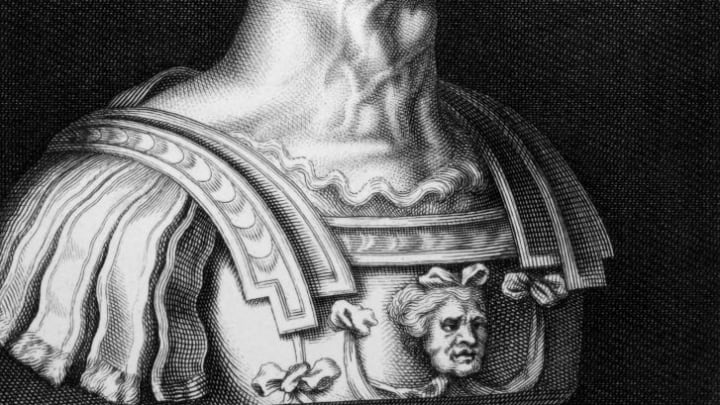
For centuries, it was believed Julius Caesar was the first baby born via Cesarean section, but that's likely far from the truth. A 10th-century Byzantine-Greek historical encyclopedia called may be the source of the confusion, since it claims C-sections got their name from Caesar himself, stating :
"The emperors of the Romans receive this name from Julius Caesar, who was not born. For when his mother died in the ninth month, they cut her open, took him out, and named him thus; for in the Roman tongue dissection is called ‘Caesar.’"
The story, however, is highly unlikely for several reasons. First, C-sections were already performed in Rome at the time. For centuries, there was a law that required C-sections be performed under certain circumstances, which was instated during the reign of Numa Pompilius , who ruled from 715–673 BCE, long before Caesar.
According to the law, if a woman died while pregnant, she had to undergo a C-section, because it was against Roman beliefs to bury a mother with her baby in her womb. The law also stated that dying pregnant women must undergo a C-section to attempt to save the life of the baby. The Suda mistakenly says Caesar’s mother, Aurelia Cotta, died during childbirth. But we know Caesar's mother lived well into his adulthood, and some historians believe she may have even outlived him, so it's unlikely she underwent a C-section and survived.
2. William Shakespeare’s play The Tragedy of Julius Caesar left out a key player in Julius Caesar’s assassination.
William Shakespeare’s play, The Tragedy of Julius Caesar , is set in 44 BCE . It explores what lead to the assassination of Caesar and the aftermath. One of the most famous quotes from the play, uttered by Caesar upon his death, is “ et tu, Brute ?” or “and you, Brutus?” But Caesar didn’t actually say that; he didn’t even know Brutus particularly well.
The real traitor was Decimus Junius Brutus Albinus . However, he was barely mentioned in the play, and his name was spelled incorrectly. In actuality, he was like a friend to Caesar. The emperor even gave him a job in politics to help restore the name of his disgraced family, and they fought alongside each other in battle. But in the end, Decimus played a key role in the assassination.
3. Julius Caesar and Cleopatra had an affair that led to a son named Caesarion.
Caesar and Cleopatra’s affair was about more than lust; it was a relationship the both of them needed to reach their own goals. For Cleopatra to secure her place on Egypt's throne, she needed an army; more accurately, she needed Caesar's vast army. On Caesar's end, he needed access to Cleopatra's incredible wealth (imagine a fortune far greater than Bill Gates 's today) to pay off debts and keep his own position in power. Cleopatra would eventually go to Rome with Caesar, where he was apparently very open about their affair. Together, they had a son, Caesarion , and Caesar's public displays of affection even included having a statue erected of Cleopatra in Rome's Temple of Venus Genetrix. She remained in Rome until Caesar was assassinated , which ultimately forced her and her son to flee.
4. Julius Caesar was assassinated on March 15, 44 BCE, after he was stabbed 23 times.
In 44 BCE, Caesar declared himself dictator for life. While many of his changes and reforms were well-received by lower- and middle-class populations , other politicians grew anxious about his ever-growing power. The animosity eventually boiled over, and on March 15, 44 BCE, the emperor was stabbed to death by what's been described as a group of approximately 40 senators.
5. Julius Caesar was Kidnaped by Pirates and demanded they ask for a higher ransom.
When Caesar was 25 years old, he was sailing the Aegean Sea and was kidnaped by Cicilian pirates . The pirates said they were going to demand 20 talents of silver (about $600,000 today), but, apparently, Caesar laughed in their face and told them they should ask for 50 (about 1550 kg of silver). While his associates went off to get the ransom, Caesar was forced to wait in captivity as the money was gathered and delivered. After he was freed, he gathered a small group of soldiers, hunted the pirates down, slit their throats, and took his silver back.
6. Julius Caesar had three wives during his life.
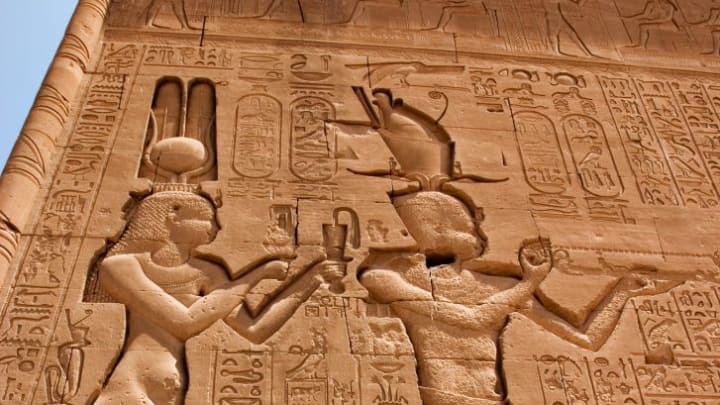
Caesar married Cornelia , his first wife, in 84 BCE. They had a daughter together but Cornelia died in 69 BCE. In 67 BCE, he married Pompeia, who he later divorced. Julius Caesar then married Calpurnia in 59 BCE, and they remained together until his death.
7. You Can visit the site Where Julius Caesar was assassinated.
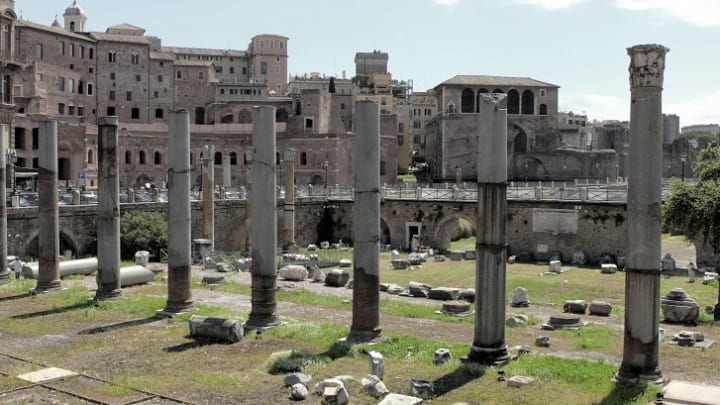
Largo di Torre Argentina is Rome’s oldest open-air square, and it was where Caesar was stabbed around 23 times on March 15, 44 BCE. It fell into disrepair during the following centuries, but after a $1.1 million restoration project, the historic site will be open to the public in 2021.
8. A bust thought to be of Julius Caesar was found in 2007.

Some historians and archeologists believe a bust pulled from the Rhône River in France in 2007 is actually of Julius Caesar . If so, it would be the only surviving statue made of the emperor while he was alive. Since most visual representations of Caesar were made after his death, historians say they tend to be idealized versions of him. But this bust is thought to resemble the leader as he really looked, showing a receding hairline and wrinkles developing on his forehead. It’s currently housed at Musée Départmental de l’Arles Antique .
Famous Julius Caesar Quotes.
- “I came, I saw, I conquered.” Or “ Veni, Vidi, Vici ,” in Latin
- “Men willingly believe what they wish.”
- “If you must break the law, do so to seize power: In all other cases observe it.”
- “No one is so brave that he is not disturbed by something unexpected.”
- “I love treason but hate the traitor.”
Famous quotes from William Shakespeare’s The Tragedy of Julius Caesar .
- “Cowards die many times before their deaths; The valiant never taste of death but once.”
- “Death, a necessary end, will come when it will come.”
- “Beware the Ides of March.” (said by a fortune-teller)
Julius Caesar biography: Facts & history
Julius Caesar became the most powerful person in Rome. Money and war paved the way for him.
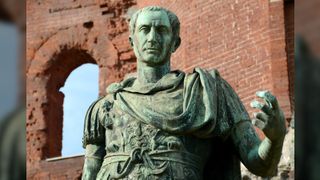
- Growing influence
Timeline of Caesar's life
Additional resources, bibliography.
Caius Julius Caesar was born around July 13, 100 B.C. and was stabbed to death in the Roman senate on March 15, 44 B.C.
By the time he was killed he had been appointed Rome's dictator for life and was the most powerful person in the Roman Republic . "He was a politician and statesman who eventually took supreme power in the Roman Republic and made himself a monarch in every practical respect, although he never took the name king," wrote historian Adrian Goldsworthy in his book " Caesar: Life of a Colossus " (Yale University Press, 2006).
"In his fifty-six years, he was at times many things, including a fugitive, prisoner, rising politician, army leader, legal advocate, rebel, dictator — perhaps even a god — as well as a husband, father, lover and adulterer," Goldsworthy wrote.
Related: The Roman Empire: Rulers, expansion and fall
Caesar's father was also named Caius (sometimes spelled Gaius) and his mother's name was Aurelia. While the term " Caesarean section " is named for him, there is no evidence that this birthing method was used to deliver Julius Caesar. "Although the procedure would later bear his name, there is no ancient evidence to suggest that Caesar was delivered by Caesarean section, although the procedure was known in the ancient world," Goldsworthy wrote.
Caesar was born into a wealthy family with a noble lineage. Members of his family were "patricians, which meant that they were members of the oldest aristocratic class at Rome, who in the early Republic had monopolized power, ruling over the far more numerous plebeians," wrote Goldsworthy. While his family was not particularly powerful at the time Caesar was born, some of his ancestors had held positions as senior officials in the Roman Republic, Goldsworthy noted.
Caesar was politically active as a teenager, opposing Lucius Cornelius Sulla, who became dictator of Rome in 82 B.C., according to the ancient Greek author Plutarch (lived A.D. 46 to A.D. 116) in his book "Parallel Lives." One of Sulla's most prominent opponents, Gaius Marius, had married into Caesar's family, and this may have influenced Caesar's decision. Sulla was fond of having his opponents murdered, and the teenage Caesar was forced to flee Rome, Plutarch wrote. At one point he was captured by Sulla's soldiers but escaped by paying a bribe.
Related: Why did Rome fall?
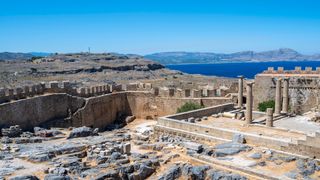
Caesar was able to return to Rome after Sulla died in 78 B.C., but he left soon after to study oratory on Rhodes, an island near modern-day Turkey. At some point on his journey he was captured by pirates, who, at least according to several near-contemporary writers, fatally underestimated Caesar. "When the pirates demanded twenty talents for his ransom, he [Caesar] laughed at them for not knowing who their captive was, and of his own accord agreed to give them fifty," Plutarch wrote (translated by Bernadotte Perrin). Plutarch doesn't say what the talents were made of, but silver is likely. How much a Roman talent could weigh at a given time is a subject of debate among historians but was likely somewhere between 60 to 100 pounds (27 to 45 kilograms) in Caesar's time.
While the money was being collected, Caesar spent time with the pirates. He "wrote poems and sundry speeches which he read aloud to them, and those who did not admire these he would call to their faces illiterate barbarians, and often laughingly threatened to hang them all. The pirates were delighted at this, and attributed his boldness of speech to a certain simplicity and boyish mirth," Plutarch wrote.
However, Caesar's threats to kill the pirates were no joke. After the ransom was paid and Caesar was released, he "immediately manned vessels and put to sea from the harbour of Miletus [in modern-day Turkey] against the robbers. He caught them, too, still lying at anchor off the island," Plutarch wrote, adding that Caesar "took the robbers out of prison, and crucified them all, just as he had often warned them."
Caesar's growing influence
Caesar's political career gradually took off after his return to Rome around 74 B.C., and he used his family's wealth and skills to help grow his power.
"He [had] a large and gradually increasing political influence in consequence of his lavish hospitality and the general splendour of his mode of life," Plutarch wrote.
Caesar was an eloquent speaker who was even able to turn personal tragedies into political gains. When his first wife, Cornelia, died in 69 B.C., Caesar used her funeral to grow his support by breaking with tradition and giving an oration that appealed to the people and showcased his caring side.
Caesar also spent lavishly, going into debt so that he could continue to give out gifts and buy political support. "He was unsparing in his outlays of money, and was thought to be purchasing a transient and short-lived fame at a great price, though in reality he was buying things of the highest value at a small price," Plutarch wrote. A pattern emerged where Caesar was elected or named to a position, spent large amounts of his own money on public projects, games or other benefits, and then was elected or named to another office.
Caesar also served as a Roman governor controlling part of Iberia from 61 to 60 B.C., where he commanded an army that fought against tribes who opposed Roman rule.
When he was in Spain, Caesar took time to read what he could about the history of Alexander the Great . Caesar wept as he did so. When Caesar "was at leisure and was reading from the history of Alexander, he was lost in thought for a long time, and then burst into tears," Plutarch wrote. When Caesar's friends asked why, Caesar replied: "While Alexander, at my age, was already king of so many peoples, I have as yet achieved no brilliant success?" Plutarch wrote.
While Caesar was able to buy and maneuver his way into senior positions he was forced to go deeper into debt and eventually formed an alliance with Marcus Licinius Crassus, one of the wealthiest people in Rome, who agreed to financially assist Caesar in exchange for his political support. The two men eventually allied with Gnaeus Pompeius Magnus, also known as Pompey, a powerful Roman general and politician, to form a triumvirate that ruled over the Roman Republic. Caesar married his daughter Julia to Pompey around 59 B.C. to forge a closer alliance.
In 58 B.C., Caesar was given command of a large military force in Gaul and used the opportunity to conquer it, making a name for himself as a military commander. Between 58 B.C. and 50 B.C. his armies gradually conquered Gaul and even succeeded in landing in Britain (though they didn't stay for long). His forces also fought Germanic tribes on the frontiers of what is now Germany.
Related: Massive hoard of Roman-era silver coins unearthed in Germany
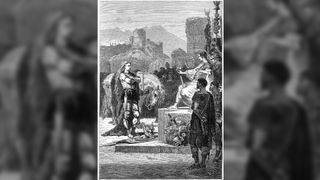
The death toll was immense. "In his triumph in 46 [B.C.] Caesar listed the number of [enemy] soldiers killed in all his battles — thus not only in Gaul — as 1,192,000," wrote Kurt Raaflaub, emeritus professor of classics and history at Brown University, in the New England Classical Journal in 2021. While the military death toll may be exaggerated, Raaflaub noted that this total doesn't include non-combatants among the people killed during Caesar's military campaigns.
"It was not only the Roman sword that inflicted death on the Gallic population. Large parts starved to death because the harvests were confiscated or destroyed and their settlements and farmsteads burned, or they froze to death when the legions drove them out of their settlements in winter and burned down buildings, villages and towns," Raaflaub wrote.
Caesar documented his military campaign in a series of books collectively known as the "Gallic Wars." While Caesar made claims that he tried to arrange truces and agreements with the tribes from Gaul he also stated that he had no qualms about harming civilians. After one group he called the "Sigambri" fled from his army he "burned all their villages and houses, and cut down their corn," Caesar wrote (translation by W. A. McDevitte & W. S. Bohn). He used the same tactics when he landed in Britain. "Damage should be done to the enemy in ravaging their lands," he wrote.
The triumvirate between Caesar, Crassus and Pompey didn't last. Julia died giving birth in 54 B.C., which ended the marriage alliance between Caesar and Pompey. Crassus, meanwhile, was killed fighting the Parthians in modern-day Turkey in 53 B.C.
Without Crassus to balance power, tensions between Caesar and Pompey increased, and in January 49 B.C. Caesar led his troops across the Rubicon River (the boundary of northern Italy) and marched on Rome. According to some historical records, as Caesar crossed the Rubicon he said the now-famous phrase that's often translated as "the die is cast."
Pompey abandoned Rome and retreated to Greece and the Balkan peninsula to gather reinforcements. He faced Caesar in Greece at the Battle of Pharsalus in 48 B.C., but suffered a decisive defeat. Pompey fled to Egypt , hoping to gain support from Egypt's teenage pharaoh Ptolemy XIII. Ptolemy was supposed to co-rule with his sister-wife Cleopatra VII , but he refused to acknowledge her, and instead he ruled alone while Cleopatra was in exile.
Instead of assisting Pompey, Ptolemy killed him and presented his head to Caesar when he arrived in Alexandria. Ptolemy expected Caesar to react positively at having his enemy removed, but Caesar was not happy and had not wanted the pharaoh to kill Pompey, Plutarch wrote. Caesar stayed in Egypt for about a year, ordering that Cleopatra VII take up her position as co-ruler of Egypt. In response, Ptolemy tried to fight Caesar and Cleopatra but was killed in 47 B.C.
Cleopatra and Caesar began a romance that resulted in her giving birth to a son, Caesarion. Whether the child was truly Caesar's is a matter of debate among historians, and Caesar never acknowledged the child as his own.
After Pompey's death Caesar was the sole ruler of the Roman Republic, but his battles were not over.
While Pompey was dead there were still forces that were loyal to him, and some Roman senators, such as Cato the Younger, refused to accept Caesar's rule. Caesar fought successful battles against these forces in North Africa and Spain. There were also battles against Pontus, a Black Sea kingdom that Pompey had defeated just a few decades earlier. After a successful battle against a force from Pontus, Caesar supposedly uttered words in Latin that are translated as "I came, I saw, I conquered," or "I came, saw and conquered." But no matter how much conquering Caesar did there were still many in Rome who opposed the idea of one man, Caesar in particular, having so much power. This resentment came despite the fact that Caesar was very willing to pardon former opponents.
"His regime was not repressive and he pardoned and promoted many former enemies," Goldsworthy wrote. In contrast, Sulla, who had been sole ruler of Rome between 82 B.C. and 78 B.C. had thousands of his fellow Romans murdered after he took power.
Related: Where is Cleopatra's tomb?
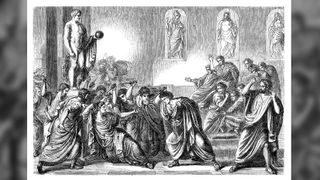
In 45 B.C. Caesar implemented a new calendar system in Rome, now called the Julian calendar , which featured 365 days a year plus an extra day in February every four years. This calendar system, which Caesar learned about in Alexandria, brought the Roman calendar closer in line to the actual seasons. The month that Caesar was born was eventually named "July" in Caesar's honor.
The new calendar "was a far more significant outcome of his visit to Egypt than any dalliance with Cleopatra," wrote Mary Beard, a professor of classics at the University of Cambridge, in her book "SPQR: A History of Ancient Rome" (Profile Books, 2015).
In January 44 B.C., the Roman senate named Caesar "dictator for life." While Caesar had enough overall support from the senate to get the measure passed there were many senators, led by Marcus Junius Brutus and Gaius Cassius Longinus, who were opposed to giving Caesar the title. Brutus and Cassius had fought against Caesar before, but both had been forgiven by Caesar and were able to retain their positions in the senate. On March 15, a date known as the Ides of March , a group of senators stabbed Caesar to death in the senate itself.
A group of senators, according to Plutarch, distracted Caesar by presenting him with several petitions. Then, a senator named Tullius seized Caesar's toga "with both hands and pulled it down from his neck," wrote Plutarch, noting that this tugging was the signal for others to start stabbing Caesar. A senator named Casca then stabbed Caesar in the neck with a dagger. The conspirators surrounded Caesar and stabbed him from different directions. Brutus, a man whom Caesar had pardoned, also stabbed Caesar, supposedly in the groin, Plutarch wrote.
"It is said that he [Caesar] received twenty-three [stab wounds]; and many of the conspirators were wounded by one another, as they struggled to plant all those blows in one body," wrote Plutarch. When William Shakespeare wrote a play about Caesar in the 16th century, he included the line "et tu Brutus?" as Caesar's last words (which can be translated as "you too Brutus?"); however, there is no evidence that he actually said this in real life.
In the wake of Caesar's death, three major factions amassed power in Rome. One was led by Octavian, Caesar's great-nephew, who in Caesar's will was named as his adopted son and heir. The other was led by Mark Antony, one of Caesar's generals, while Brutus and Cassius led the other faction. Rome once again fell into civil war.
July 13, 100 B.C.: Caesar was born in the Suburra area of Rome.
82 B.C.: Sulla become dictator of Rome; Caesar speaks out against him and is forced to flee Rome.
78 B.C.: Sulla dies and Caesar returns to Rome shortly afterward.
75 B.C.: Caesar goes to Rhodes to study oratory but is detained by pirates.
74 B.C.: Caesar returns to Rome, gets involved with politics, using family fortune to amass influence.
69 B.C.: Caesar's first wife Cornelia dies. Caesar gives speech about her that increases his popularity.
61-60 B.C.: Caesar serves as governor of Iberia, defeats tribes who oppose Roman rule.
60 B.C.: Caesar, Crassus and Pompey form triumvirate to rule Rome.
59 B.C.: Caesar's daughter Julia marries Pompey.
58-50 B.C.: Caesar campaigns in Gaul and England, conquering a vast amount of territory.
54 B.C.: Julia dies giving birth to Pompey's child, who also does not survive.
53 B.C.: Crassus is killed fighting the Parthians.
January 49, B.C.: Caesar crosses the Rubicon and marches on Rome.
August 9, 48 B.C.: Caesar defeats Pompey at the Battle of Pharsalus in Greece; Pompey flees to Egypt.
September 48 B.C.: Pompey killed by Egyptian pharaoh Ptolemy XIII; Caesar is presented with the head and is reportedly disgusted at the way Pompey was treated.
September 48 B.C. – January 47 B.C.: Caesar restores Cleopatra VII to power. Ptolemy XIII fights against Caesar and Cleopatra's forces but is killed.
June 47 B.C.: Caesarion, the son of Caesar and Cleopatra VII, is born. Caesar doesn't acknowledge the child as his own.
45 B.C.: Caesar implements new calendar system in Rome that has 365 days in a year and an extra day in February every four years.
January 44 B.C.: Senate names Caesar "dictator for life."
March 15, 44 B.C.: Caesar is stabbed to death in the Roman senate.
- The National Council of Teachers of English has a plethora of lesson plans related to Julius Caesar.
- Philip Freeman's 2009 book reveals in great detail "a biography of the cunning Roman conqueror Julius Caesar."
- This History Channel video describes how Julius Caesar sparked civil war.
Beard, Mary (2015) SPQR: A History of Ancient Rome . Profile Books
Goldsworthy, Adrian (2006) Caesar: Life of a Colossus . Yale University Press
Raaflaub, Kurt (2021) Caesar and Genocide: Confronting the Dark Side of Caesar's Gallic Wars . New England Classical Journal, Iss 1
Sign up for the Live Science daily newsletter now
Get the world’s most fascinating discoveries delivered straight to your inbox.

Owen Jarus is a regular contributor to Live Science who writes about archaeology and humans' past. He has also written for The Independent (UK), The Canadian Press (CP) and The Associated Press (AP), among others. Owen has a bachelor of arts degree from the University of Toronto and a journalism degree from Ryerson University.
1,700-year-old Roman fort discovered in Germany was built to keep out barbarians
'Richly decorated' Roman villa with 'curse tablets' and tiny axes unearthed in England
Exercise may reverse sign of aging by 'flushing' fat from muscle
Most Popular
- 2 Here are the best photos of the April 8 total solar eclipse over North America
- 3 Underwater mountain range off Easter Island hosts creatures unknown to science, expedition reveals
- 4 Uranus and Neptune aren't made of what we thought, new study hints
- 5 Total solar eclipse reveals tiny new comet moments before it was destroyed by the sun
- 2 Uranus and Neptune aren't made of what we thought, new study hints
- 3 Eclipse from space: See the moon's shadow race across North America at 1,500 mph in epic satellite footage
- 4 Largest 3D map of our universe could 'turn cosmology upside down'
- 5 James Webb telescope finds origins of the biggest explosion since the Big Bang — revealing a new cosmological mystery
- History Classics
- Your Profile
- Find History on Facebook (Opens in a new window)
- Find History on Twitter (Opens in a new window)
- Find History on YouTube (Opens in a new window)
- Find History on Instagram (Opens in a new window)
- Find History on TikTok (Opens in a new window)
- This Day In History
- History Podcasts
- History Vault
Julius Caesar: 6 Ways He Shaped the World
By: Christopher Klein
Updated: September 22, 2023 | Original: July 14, 2023

More than 2,000 years after his death, Julius Caesar remains one of history’s most momentous figures. His military and political achievements transformed ancient Rome and left a legacy that still endures—from our idioms (“crossing the Rubicon”) to our calendar. The following are six of the most important legacies of the renowned Roman military commander and dictator.
1. Caesar expanded Roman rule in Europe.
After being appointed governor of Rome’s northern territory of Gaul in 58 B.C., Caesar vastly extended the boundaries of the Roman Republic across Europe, all the way to the shores of the Atlantic Ocean and English Channel. During the bloody eight-year Gallic Wars, his legions conquered local tribes in present-day France, Belgium and Switzerland.
In 55 B.C., Caesar’s army built a timber bridge spanning the Rhine River in just 10 days—a marvel of military engineering. Then, Roman troops marched across the waterway for the first time ever to subdue German tribes threatening eastern Gaul. Later that year, the Roman general commanded the first of two expeditions across the English Channel. These initial incursions into Britain laid the foundation for Rome’s eventual conquest of much of the island.
2. He started a civil war by ‘crossing the Rubicon.’
Through his masterful battlefield tactics and willingness to fight in combat, Caesar earned the respect and loyalty of his soldiers. He also earned the jealousy of Pompey, his former political ally in the First Triumvirate who effectively ran Rome. When Pompey’s supporters in the Roman Senate demanded that Caesar disband his army and return to Rome as a civilian, he refused.
Instead, in 49 B.C., Caesar brazenly led a legion across the Rubicon River, which divided Gaul and Rome, sparking a civil war. Forces supporting Caesar on one side and Pompey on the other battled as far away as Spain, Greece and North Africa. Although outnumbered, Caesar’s legions defeated Pompey’s army in a decisive battle at Pharsalus, Greece, in 48 B.C., prompting Pompey to flee to Egypt. But before he could even step ashore, he was assassinated at the behest of the teenaged pharaoh Ptolemy XIII . Ptolemy, it turned out, sought Caesar’s support in Egypt’s own civil war—one that had pitted him against his co-regent and sister, Cleopatra VII .

Ancient Empires
Watch the three-episode documentary event, Ancient Empires . Available to stream now.
3. Caesar installed Cleopatra on the Egyptian throne.
When Roman reinforcements arrived in early 47 B.C., Caesar’s forces defeated Ptolemy’s army in the Battle of the Nile. After the young king drowned in the Nile River while fleeing the battle, Caesar installed Cleopatra and her 12-year-old half-brother, Ptolemy XIV, as co-regents, but the queen held the true power.
But Ptolemy gravely miscalculated. When he presented Caesar with Pompey’s severed head upon his arrival in Alexandria, the reaction wasn’t gratitude; it was horror. Caesar promptly executed Pompey’s assassins and sided with Cleopatra in Egypt’s civil war.
According to the ancient historian Plutarch, Caesar had the 21-year-old Cleopatra transported into the royal palace where he had taken residence by having her smuggled inside a linen sack filled with dirty laundry. As urban warfare erupted in Alexandria, the pair began a romance while besieged in the palace for six months.
Around the time Caesar returned to Rome, Cleopatra gave birth to a boy believed to be his son. The Egyptian queen named him Ptolemy XV, but Alexandrians mockingly referred to the boy as Caesarion, “Little Caesar.”In 46 B.C., Cleopatra and her infant son moved into a villa on the banks of Rome’s Tiber River, and the married Caesar continued to visit his mistress in apparent violation of Rome’s bigamy laws.
Following Caesar’s murder, Cleopatra returned to Egypt and later had a love affair and alliance with Caesar’s deputy, Mark Antony . The pair committed suicide after Augustus defeated their armies in 31 B.C.
4. He ruled over Rome as a dictator.
Buoyed by the support of his army and Rome’s plebeians (non-elite citizens), Caesar emerged from his war with Pompey with tremendous power. After being named dictator of Rome for 10 years in 46 B.C., he declared himself “dictator for life” the following year. Caesar’s sweeping reforms—such as granting property to retiring soldiers, redistributing land to the poor and canceling debts—proved popular with the military and Rome’s lower and middle classes.
Caesar’s reforms angered elites, as did his disregard for the Roman Senate and republican tradition. A cult of personality developed around Caesar as he minted coins with his image, celebrated his birthday as a public holiday and ruled the Senate from a golden throne.
5. His assassination led to the collapse of the Roman Republic—and the rise of the Roman Empire.
Caesar’s autocratic rule heralded the dawn of the Roman Empire. Dozens of senators who believed Caesar’s concentration of absolute power threatened the republic’s democratic institutions plotted his murder , which occurred on the Ides of March in 44 B.C.
Rather than saving the 400-year-old Roman Republic, however, the assassination accelerated its demise . In their attempt to thwart a dictator, the senators inadvertently created an emperor . Caesar’s heir, Augustus, emerged from a lengthy civil war as Rome’s supreme leader after purging his enemies, murdering Caesar’s assassins and cracking down on republicans. Augustus deified Caesar (effectively making Augustus the son of a god) and ushered in the autocratic Roman Empire, which lasted for approximately five centuries.
6. He introduced the modern calendar.
Caesar was so powerful that he changed time. The traditional Roman calendar, which was based on the 355-day lunar year, required constant revisions since it fell out of sync with seasons and festivals. Aided by the Greek mathematician and astronomer Sosigenes, Caesar enacted the Julian calendar, which was based on the 365¼-day solar year with a “ leap day ” added every four years.
To reboot the calendar, 46 B.C. spanned 445 days before Caesar’s system took effect on January 1 in 45 B.C. The Julian calendar predominated in most of the Western world for 16 centuries. Since each solar year is slightly less than 365¼ days, the Julian calendar gained one day every 131 years. By the 1500s, the calendar was 10 days out of step with the seasons. In 1582, Pope Gregory XIII modified the calendar by eliminating 10 days from that year and decreeing that only one out of every four centennial years would be leap years. The Julian calendar is still in use in portions of the Eastern Orthodox Church.
An additional legacy of Caesar can be seen on the calendar. Following Caesar’s assassination, the name of his birth month was changed from Quintilis to Julius (July) in his honor.

HISTORY Vault: Colosseum
The Roman Empire is vividly brought to life through the lens of the Colosseum.

Sign up for Inside History
Get HISTORY’s most fascinating stories delivered to your inbox three times a week.
By submitting your information, you agree to receive emails from HISTORY and A+E Networks. You can opt out at any time. You must be 16 years or older and a resident of the United States.
More details : Privacy Notice | Terms of Use | Contact Us
Ancient Rome
Biography of julius caesar.
Biographies >> Ancient Rome
- Occupation: Roman general and dictator
- Born: July 100 BC in Rome, Italy
- Died: 15 March 44 BC in Rome, Italy
- Best known for: Being the dictator of Rome and putting an end to the Roman Republic

- Caesar was once kidnapped by pirates while still a young man. He joked with them that he would have them executed once he was free. They laughed, but Caesar had the last laugh when he later captured them and had them killed.
- Caesar's uncle was Gaius Marius, a famous war hero known for reorganizing the Roman army.
- The date of Caesar's death, March 15th, is also called the Ides of March.
- While in Egypt he fell in love with the queen of Egypt, Cleopatra . He helped her to become pharaoh and had a child named Caesarion with her.
- Caesar's heir was his nephew Octavian. Octavian became the first Roman emperor changing his name to Caesar Augustus.
- Listen to a recorded reading of this page:
Back to History for Kids
Julius Caesar: The Colossus of Rome. Roman Imperial Biographies
Richard westall . [email protected].
Richard Billows has written a detailed and engaging biography of Julius Caesar that is primarily aimed at an audience unacquainted with the Graeco-Roman world and Classical scholarship. For this reason, the work is not merely a biography, but also an account of the period in which Caesar lived. Structured accordingly, this work is dedicated to providing a rather meticulous chronicle of the political and military history of the last century of the Republic, with some attention to the period’s socio-economic realities, as viewed through the lens provided by the life of Caesar.
This book is divided into ten chapters of more or less equal dimensions. After a prologue, in which Billows sets the stage by asking how Caesar came to cross the Rubicon and unleash a civil war, the first chapter is dedicated to setting forth the background for the histoire événementielle of the first century BCE. The second chapter treats of the early years of Caesar’s life and recounts the political and military history of the 90s and 80s BCE. The third chapter deals with the 70s BCE, providing a contrast between Caesar’s traditional entry into Roman politics and the meteoric rise of Pompeius Magnus. The fourth chapter recounts the events of the 60s BCE, investigating Caesar’s involvement — or lack thereof — with figures such as Pompeius and Catilina. The fifth chapter focuses exclusively upon the events of Caesar’s first consulate in the highly controversial year 59 BCE. The sixth chapter follows Caesar abroad so as to narrate the conquest of Transalpine Gaul in the years 58-50 BCE. The seventh chapter provides a narrative for the political manoeuvres that transpired at Rome during this same period. The eighth chapter provides a respite from the increasing tension of the political and military narrative by focussing upon the literary contributions of Caesar, providing a brief analysis and contextualization of Caesar’s oeuvre. The ninth chapter resumes the progression of histoire événementielle with an account of the civil war fought in the years 49-45 BCE. The tenth and final chapter narrates the events leading up to Caesar’s assassination, offering an analysis of that event. An epilogue highlights the lasting influence exerted by Caesar even in death, arguing for his unique position in history as the charismatic leader of a political and social movement. The life of Caesar proves a vehicle for narrating the political and military history of the late Republic, whereas that traditional historical narrative in turn affords a proper understanding of Caesar. This is biography in the best of the Classical tradition, and as it must be written — if the endeavour is to be attempted at all — for any figure in the Graeco-Roman world.
Billows has written a learned book that is alternately a pleasure to read and quite frustrating. The narrative is replete with details, but proves anything other than tedious. The analyses that accompany this narrative are clear and frequently appealing. The documentation is focussed upon ancient literary sources rather than modern treatments. In short, this “biography” of Caesar will prove of interest and possible use for a general readership as well as for Classicists perhaps wishing to round out or review what they know from prior study of the subject. But the lack of direct citation of the sources is troubling, for it is always the authorial voice of Billows that readers hear. Exemplary is the fact that Caesar left extensive writings, but not once are readers given a direct quote from this invaluable source as to the man’s actions and personality. 1 Moreover, Billows is capable of indulging in historical fiction with alarming ease and lack of sufficient notice for the unwary reader. So, for example, he provides guest-lists for two dinner-parties held on the eve of Caesar’s assassination. That attended by Caesar is imagined as having included Cleopatra. 2 That held by C. Cassius is entirely hypothetical. Only in the end-notes does Billows notify his readers of the nature of this historical reconstruction (pp. 282 nn. 1-2). Undergraduates and the ingenuous will have a field day with items like this.
Readers are advised against looking to this work for any particularly new insights into the world of the late Republic. Billows is open to the critical ideas of an “outsider” such as M. Parenti (as regards the credibility of Cicero and later sources for the so-called “Catilinarian conspiracy”) and advances credible (to a certain degree) reasons for viewing the political history of the last century of the Republic as dominated by two opposed political movements: optimates and populares . But, as is the case with all recent works of this sort dedicated to Caesar, he shows himself by and large willing to repeat what is to be found within the modern vulgate. Hence, to cite but one example, Billows writes that “Caesar and his officers were enormously enriched” by their conquest of Gaul in the 50s BCE (p. 164). The wealth of Gaul was described in glowing terms by contemporaries, and many of those who associated with Caesar did so for the sole purpose of being “covered in gold”. 3 But the account of Billows, like that of most of his predecessors from Mommsen onwards, accepts this evidence at face value. In the wake of the Bernard Madoff scandal and similar situations, we would do well to exercise a critical spirit and express scepticism over Caesar’s financial gains from his arduous campaigning in the north. In a passage that has been consistently overlooked by modern scholars, Suetonius relates that Pompeius believed Caesar to be financially insolvent on the eve of civil war and for this reason to be desirous of a conflict. 4 Even had the Romans maintained accounts as is done today and even if these survived, the situation would be complicated, as the proposed modern parallel with Madoff shows. Nevertheless, such a critical questioning of the evidence and hypotheses of this sort are what we might expect of a work that seeks to revolutionise our vision of the late Republic and prove a lasting contribution to the field. Billows has written a book that is highly readable and competently fashioned, but it is unlikely to prove a standard work of reference as was the case with R. Syme’s Roman Revolution , M. Gelzer’s Caesar , or E.S. Gruen’s The Last Generation of the Roman Republic . On the other hand, introductions — as this book is described on the back cover — are perhaps not the place for the elaboration of new ideas nor poised to become classics in their fields.
Indeed, it may be questioned whether there was need of yet another biography of Caesar. It might have been thought that the market is already saturated. No fewer than nine books dedicated to Caesar’s life (or death) have appeared in English in the last decade, one of these also published by Routledge! 5 Of these works, two distinguish themselves for their being accessible to general readers and for their being written in a style that is equally engaging: Goldsworthy has shown a talent for the description of military encounters whereas Tatum is quite good at providing a tableau of the political situation. In the midst of this abundance, Billows’s work struggles to distinguish itself. Moreover, the price of this book in the hard-cover edition (and in that for “kindle”) will make it inaccessible to the general public. The price of $120.00 — which comes to nearly $0.36 per page — seems disproportionate to production costs, and is most certain to curtail the work’s diffusion. Was yet another biography of Caesar opportune?
The question becomes all the more acute when Billows’s work is compared with the “classics” produced by his predecessors in the twentieth century. The most important of these are Meier and Gelzer, both available in English translations. 6 Written in the same style and available in paperback format, Meier’s biography of Caesar suffers from the absence of footnotes, which is no great loss for a work aimed at the general public. The biography of Caesar written by Gelzer, on the other hand, is written in a style that is perhaps less “lively”, but has a wealth of documentation that far surpasses what is provided by Billows For example, Billows mentions a six-line poem by Caesar in which he compared the comic playwrights Menander and Terence (p. 35). The poem is not cited, either in the original Latin or in English translation. Moreover, without any supporting proof, the piece is cited as an example of the juvenilia written by Caesar. Turning to Gelzer’s biography, we find not only an ampler bibliography on the subject, but also citation of the original poem and the thesis advanced — convincingly for this reviewer — to the effect that the poem belongs to Caesar’s later years. 7 Gelzer’s work was last revised in German for the sixth edition of 1960, upon which edition the English translation of 1968 is based. Despite its obvious lack of reference to the last half-century of scholarship, however, that treatment indisputably remains the standard scholarly biography of Caesar. Without the scholarly apparatus of footnotes — ever to be preferred to the solution of end-notes adopted in the present instance — and reference to modern treatments of various points of detail, Billows’s work cannot expect to replace that written by Gelzer. There is urgent need of an updated version of Gelzer, but Billows’s book does not meet this need.
Billows places a great deal of interpretative weight upon what he identifies as the two political movements of the late Republic: the optimates and the populares . The thesis is seductive and not without a certain appeal. However, questions obtrude upon this reconstruction. What is the Latin or Greek for “political movement”? In the absence of a linguistic description, can such a social phenomenon be said to exist? The reviewer has grave doubts, in view of the last half-century’s research into the language of politics and the democratic nature of the Republic. 8 By the standards of the contemporary Anglo-American world, the political landscape of ancient Rome was extraordinarily fragmented and highly susceptible to rapid changes of allegiance. Moreover, the factiones identified by our sources cannot be equated with “political movements”, as the very notion is part of a denigratory rhetoric aimed at the destruction of political opponents and the positive political identities of optimates and populares are far more nebulous than the word “movement” would imply. Hence, Billows’s attempt to resuscitate the nineteenth- and twentieth-century notion of political parties fails to convince despite its aesthetic appeal.
Billows deals with military campaigns in summary fashion, thereby avoiding the problems that emerge when one enters into the details. It is as though Caesar’s enemies were mere cannon-fodder waiting to be killed so as to illustrate his greatness as a general. Unwary readers will be surprised to find that there is a long-running debate over the location of the battle of Pharsalus. And they will come away with no idea of what John Keegan has evocatively termed “the face of battle”. Popular images from cinema and cable television are all too likely to fill this lacuna for Billows’s readers. That is a shame, for the details of military life reveal much about the nature of the Roman achievement and the limits to which it was subject. 9 Similarly, soldiers fill the legions of Caesar and his contemporaries as if by magic. 10 There is no sense here of the disruption caused by mobilization, such as what has been experienced in the United States and (to a lesser degree) Great Britain in the wake of the attack upon the Twin Towers. Yet, some 50 legions under arms in the early 40s BCE surely affected in visible fashion the human landscape of the towns and countryside of Italy.
Billows is primarily concerned with political and military history, but he does incorporate some of the more important findings of social and economic history into his narrative and analyses. Hence, he shows great sophistication in his treatment of the interest of various members of the gens Iulia in extending the Roman franchise to the citizens of the various city-states of the Italian pensinsula (e.g. p. 40). Similarly, he exhibits commendable caution in accepting the testimony of Cicero and later authors as regards the programme behind the so-called “Catilinarian conspiracy” (pp. 88, 94-96). Yet, he shows a dismaying tendency to relate statistics from ancient authors as though they possess the same empirical value as statistics used in most of the Western world today, even though frequently using qualifiers on the order of “reportedly” or “said to have numbered”. As was well shown at the outset of the last century and as has been recently re-stated with great clarity and force, the Graeco-Roman use of numbers is better described as rhetorical rather than empirical. 11 Whether dealing with the claim that the Senate had 300, 600, or 900 members (e.g. pp. 36, 52, 241) or the allegation that Caesar purchased for HS 100,000,000 the land upon which he built the Forum Iulium (p. 177), the historian needs to be aware that certain figures recur too frequently in the literary sources to be anything other than conscious rhetorical representations. 12 Likewise important and neglected is the need to contextualize those few numbers transmitted by the sources. How many readers are likely to understand the value of 1,300 talents (p. 63)? Even a minimalist table for currencies in an appendix would have been of use.
The most serious and extraordinary omission from this work is any reference whatsoever to the epigraphic or archaeological evidence. The evidence of monuments, funerary deposits, and coins would have manifestly enriched Billows’s narrative, as is shown by a comparison with W.J. Tatum’s biography of Caesar and the recent exhibition dedicated to Caesar in Rome, Italy. 13 . The testimony of inscriptions would have been no less eloquent an addition to this work. As it stands, the reviewer can find only four instances in which reference is made to the epigraphic evidence and even that is extraordinarily perfunctory (pp. 265 nn. 11-12, 268 n. 39, 280 n. 23). Yet, without the evidence of the Fasti , we should not know the date of the battle of Pharsalus. 14 Without the evidence of inscriptions from the Greek eastern Mediterranean, we should not know how contemporaries in the provinces viewed Caesar’s victory at Pharsalus, praising him as a “saviour and benefactor” 15 and instituting a new era commencing with that victory. 16 Instances of epigraphy’s contribution to our knowledge of ancient history are legion, their absence from this work altogether baffling. It is as though the last two centuries of scholarship had never transpired.
The production of this biography is overall of high quality. Copy-editing was excellent, even if one might quibble about using forms such as “Chalkedon” and “Kyzikos” in a work dedicated to Roman history. Errors such as “Roscius of America” (pp. 267 n.65, 289) and “Herrenius” (p. 290) are fortunately extremely rare. Yet, in view of the size of Routledge, the publisher’s inability to use appropriate diacriticals in the (surprisingly few) French and German titles appearing within the bibliography is not only annoying, but also inexplicable. The only evident problems emerge in the genealogies and maps provided at the outset (pp. xvii-xxii). On the one hand, unwary readers may assume that Octavian was the natural son of Julius Caesar or find various marriages hard to reconstruct. On the other hand, it would have made more sense to provide two maps for the Forum Romanum and environs (pre-54 and post-46), to indicate Dyrrachium and Antioch-on-the-Orontes rather than Philippi and Actium, and to eliminate infelicities on the order of “Temples of Jupiter Optimus Maximus” and “Homea Galbana”. Perhaps, in view of the Barrington Atlas of the Classical World , the failure to show readers the location of most of the cities and regions mentioned in the text is not an irremediable loss. However, geographical notions within the written text are not always as clear or correct as they might be. Hence, the central Italian city of Corfinium — located roughly 150 km due east of Rome — is described as being situated “in the northern Appenine region” (p. 205). Knowledge of that fact is crucial to a proper understanding of the diverse strategies followed by the protagonists in the first months of 49 BCE. These errors and infelicities reflect as much Billows’s lack of attention to the artistic and archaeological evidence as any failing on the part of the publisher.
“Light” reading for lovers of ancient history, Billows’s biography of Caesar is appropriate to a general audience wanting detail but lacking a basic knowledge of the subject. It may even prove of use to those desperately seeking to put lecture-notes into order at the last minute. Stylistically a pleasure to read and crammed full of details, it has something to offer these categories of readers. However, it was never intended nor should be misconstrued as a serious contribution to scholarship on the subject. The work of Gelzer endures.
1 . Cf. p. 261, the sole instance, where it is Cicero’s judgement of Caesar that is cited. A similar criticism was expressed some years ago with regard to CAH Vol. 14: F. Millar, “Emperors need their voices”, Times Higher Education 14 Sept. 2001 .
2 . A tempting and natural question arises: What did Cleopatra have to say to Calpurnia on this occasion? That would most certainly have been an interesting conversation, as the reviewer has had the chance to witness in modern Rome and elsewhere.
3 . E.g. C. Trebatius Testa, as is indicated by the humorous language at Cic. Fam. 7.13.1: Audi, Testa mi: utrum superiorem te pecunia facit an quod te imperator consulit? Moriar ni, quae tua gloria est, puto te malle a Caesare consuli quam inaurari .
4 . Suet. Iul. 30.2.
5 . M. Griffin, ed., A Companion to Julius Caesar (Oxford 2009); W.J. Tatum, Always I Am Caesar (Malden 2008); P. Freeman, Julius Caesar (New York 2008); L. Canfora, Julius Caesar: The People’s Dictator , tr. M. Hill and K. Windle (Edinburgh 2007) [= Giulio Cesare: il dittatore democratico (Bari 1999)]; A. Goldsworthy, Caesar: Life of a Colossus (New Haven 2006); A. Kamm, Julius Caesar: A Life (London 2006); J. Osgood, Caesar’s Legacy: Civil War and the Emergence of the Roman Empire (Cambridge 2006); G. Woolf, Et tu, Brute? The Murder of Caesar and Political Assassination (London 2006); M. Parenti, The Assassination of Julius Caesar: A People’s History of Ancient Rome (New York 2003); P. Southern, Julius Caesar (Stroud 2001); R. Jimenez, Caesar Against Rome (New York 2000); idem , Caesar Against the Celts (New York 1996); cf. M. Wyke, ed., Julius Caesar in Western Culture (London 2006). With the exceptions of Griffin 2009 and Freeman 2008, these all appear within the bibliography provided by Billows. Naturally, a similar profusion can be discerned within French, German, and Italian publications. Worthy of being drawn to readers’ attention are two works in particular that offer sound, detailed introductions: Y. Le Bohec, César chef de guerre: César stratège et tacticien (Paris 2001); E. Baltrusch, Caesar und Pompeius (Darmstadt 2004).
6 . C. Meier, Caesar: A Biography (New York 1982); M. Gelzer, Caesar: Politician and Statesman , tr. P. Needham (Cambridge, Mass. 1968).
7 . Gelzer, op. cit. , p. 140 n.1 (= pp. 126-127 n. 158 in the German edition of 1960).
8 . E.g. J. Hellegouarc’h, Le vocabulaire latin des relations et des partis politiques sous la République (Paris 1963); F. Millar, The Crowd in Rome in the Late Republic (Ann Arbor 1998).
9 . P. Erdkamp, Hunger and the Sword: warfare and food supply in Roman Republican wars (264-30 B.C.) (Amsterdam 1998); J. Roth, The logistics of the Roman army at war (264 B.C.-A.D. 235) (Leiden 1998).
10 . Cf. P.A. Brunt, Italian Manpower 225 B.C.-A.D. 14 (Oxford 1971); N. Morley, “The transformation of Italy,” JRS 91 (2001) 50-62.
11 . W. Scheidel, “Finances, Figures and Fiction,” CQ 46 (1996) 222-238; E. Wölfflin, “Sescenti, mille, centum, trecenti als unbestimmte und runde Zahlen” Archiv für lateinische Lexikographie und Grammatik 9 (1896) 177-192; idem , “Zur Zahlensymbolik,” loc. cit. , 333-351; idem , “Das Duodecimalsystem,” loc. cit. , 527-544.
12 . The reviewer admits to a similar “sin of youth”, in “The Forum Iulium as Representation of Imperator Caesar,” Römische Mitteilungen 103 (1996) 198-224, but finds incomprehensible Billows’s lack of awareness of contemporary historiographic debates.
13 . Giulio Cesare : l’uomo, le imprese, il mito [esposizione Chiostro del Bramante, Rome, 23 ottrobre 2008 – 3 maggio 2009] , a cura di Giovanni Gentili (Cinisello Balsamo, Milano 2008).
14 . Inscr. Ital. 13.1.190f., 208; characteristically absent from the chronological table provided by Canfora 2007/1999.
15 . A.E. Raubitschek, “Epigraphical Notes on Julius Caesar,” JRS 44 (1954) 65-75.
16 . W. Leschhorn, Antike Ären: Zeitrechnung, Politik und Geschichte im Schwarzmeerraum und in Kleinasien nördlich des Taurus. Historia Einzelschriften Heft 81. Stuttgart 1993.
- Recent changes
- Random page
- View source
- What links here
- Related changes
- Special pages
- Printable version
- Permanent link
- Page information
- Create account
Top Ten Books on Julius Caesar
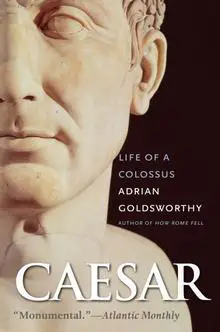
Julius Caesar has cast a shadow over western history for two millennia. He was a remarkable general, a people's champion, the destroyer of the Roman Republic and the creator of the Roman Empire. Each of these books not only try to tell Caesar's story but attempt to understand his impact on the world.
Goldsworthy, Adrian, Caesar: Life of a Colossus (Yale University Press, 2008)
In the introduction to his biography of the great Roman emperor, Adrian Goldsworthy writes, “Caesar was at times many things, including a fugitive, prisoner, rising politician, army leader, legal advocate, rebel, dictator . . . as well as husband, father, lover, and adulterer.” In this landmark biography, Goldsworthy examines Caesar as a military leader, all of these roles and places his subject firmly within the context of Roman society in the first century B.C.
"Adrian Goldsworthy is one of our most promising young military historians today."—Sir John Keegan, author of The Iraq War
Freeman, Philip. Julius Caesar . (Simon and Schuster, 2008)
In this splendid biography, Freeman presents Caesar in all his dimensions and contradictions. With remarkable clarity and brevity, Freeman shows how Caesar dominated a newly mighty Rome and shaped its destiny. This book will captivate readers discovering Caesar and ancient Rome for the first time as well as those who have a deep interest in the classical world.
"Can Alexander Hamilton possibly have been right that Julius Caesar was 'the greatest man who ever lived'? Reading Philip Freeman's pacy and panoptic narrative of Caesar's life from unpromising early beginnings to the fateful Ides is one very rewarding approach to answering that perennially fascinating question." -- Paul Cartledge, Professor of Greek History, University of Cambridge
Suetonis, Grant, Robert, trans. The Twelve Caesars (New York: Penguin Books, 1979)
As private secretary to Emperor Hadrian, the scholar Suetonius had access to the imperial archives and used them (along with eyewitness accounts) to produce one of the most colorful biographical works in history. The Twelve Caesars chronicles the public careers and private lives of the men who wielded absolute power over Rome, from the foundation of the empire under Julius Caesar and Augustus to the decline into depravity and civil war under Nero and the recovery that came with his successors.
Osgood, Josiah. Caesar's Legacy: Civil War and the Emergence of the Roman Empire (Cambridge, Cambridge University Press, 2006)
In April 44 BC the eighteen-year-old Gaius Octavius landed in Italy and launched his take-over of the Roman world. Defeating first Caesar's assassins, then the son of Pompey the Great, and finally Antony and the Egyptian queen Cleopatra, he dismantled the old Republic, took on the new name 'Augustus', and ruled forty years more with his equally remarkable wife Livia. Caesar's Legacy grippingly retells the story of Augustus' rise to power by focusing on how the bloody civil wars which he and his soldiers fought transformed the lives of men and women throughout the Mediterranean world and beyond. During this violent period, citizens of Rome and provincials came to accept a new form of government and found ways to celebrate it. Yet they also mourned, in literary masterpieces and stories passed on to their children, the terrible losses they endured throughout the long years of fighting.
'… a fine achievement … A vision of the remarkable period now exists where none existed before. In his first book, Mr. Osgood provides an admirable demonstration of original scholarship, and he is to be warmly congratulated.' Bryn Mawr Classical Review
Holland, Tom. Rubicon: The Last Years of the Roman Republic (London, Anchor Press, 2003)
Rubicon is vivid historical account of the social world of Rome as it moved from republic to empire. In 49 B.C., the seven hundred fifth year since the founding of Rome, Julius Caesar crossed a small border river called the Rubicon and plunged Rome into cataclysmic civil war. Tom Holland’s enthralling account tells the story of Caesar’s generation, witness to the twilight of the Republic and its bloody transformation into an empire. From Cicero, Spartacus, and Brutus, to Cleopatra, Virgil, and Augustus, here are some of the most legendary figures in history brought thrillingly to life.
Combining verve and freshness with scrupulous scholarship, Rubicon is not only an engrossing history of this pivotal era but a uniquely resonant portrait of a great civilization in all its extremes of self-sacrifice and rivalry, decadence and catastrophe, intrigue, war, and world-shaking ambition.
Goodman, Rob. Rome's Last Citizen: The Life and Legacy of Cato: Mortal Enemy of Caesar (St. Martin's Griffen, 2014)
Marcus Porcius Cato: an aristocrat who walked barefoot and slept on the ground with his troops, political heavyweight who cultivated the image of a Stoic philosopher, a hardnosed defender of tradition who presented himself as a man out of the sacred Roman past—and the last man standing when Rome's Republic fell to tyranny. His blood feud with Caesar began in the chamber of the Senate, played out on the battlefields of a world war, and ended when he took his own life rather than live under a dictator.
Syme, Ronald, The Roman Revolution (Oxford, Oxford University, 2002).
The Roman Revolution is a profound and unconventional treatment of a great theme - the fall of the Republic and the decline of freedom in Rome between 60 BC and AD 14, and the rise to power of the greatest of the Roman Emperors, Augustus. The transformation of state and society, the violent transference of power and property, and the establishment of Augustus' rule are presented in an unconventional narrative, which quotes from ancient evidence, rarely refers to modern authorities, and states controversial opinions quite openly. The result is a book which is both fresh and compelling.
`the most complete and the most challenging history of its subject which has appeared for many years, in England perhaps at any time ... Nor is this book only for the specialist, for the subject is of prime importance, the information is the best which modern research can provide.' Oxford Magazine
Related Articles
- How did Caesar's conquest of Gaul change both Rome and Gaul
- What were the consequences of Caesar's assassination
- Why was Julius Caesar assassinated
- What made Julius Caesar a great general
- How did Julius Caesar rise to power
Jiménez, Ramon L., Caesar Against Rome: The Great Roman Civil War (New York, Praeger, 2006).
Caesar Against Rome is an absorbing narrative of the four-year Roman Civil War that began with Caesar's crossing of the Rubicon in 49 BCE. Focusing always on Caesar, the book sketches a panorama of Roman society―the first society to display the ambition, greed, and intrigue of modern politics―in the last century before Christ. Caesar was a complex and contradictory figure, extraordinarily talented and extremely ambitious, but at the same time vain, careless, and inclined to be forgiving. While Caesar's unusual show of mercy was a significant factor in winning popular support, soldiers, and towns to his side, it allowed all enemy leaders to return to the battlefield against him.
Kurt A. Raalaab, trans., The Landmark Julius Caesar: The Complete Works: Gallic War, Civil War, Alexandrian War, African War, and Spanish War (Anchor Books, 2019)
The Landmark Julius Caesar is the definitive edition of the five works that chronicle the military campaigns of Julius Caesar. Together, these five narratives present a comprehensive picture of military and political developments leading to the collapse of the Roman Republic and the advent of the Roman Empire.
The Gallic War is Caesar’s account of his two invasions of Britain and of conquering most of what is today France, Belgium, and Switzerland. The Civil War describes the conflict in the following year which, after the death of his chief rival, Pompey, and the defeat of Pompey’s heirs and supporters, resulted in Caesar’s emergence as the sole power in Rome. Accompanying Caesar’s commentaries are three short but essential additional works, known to us as the Alexandrian War, the African War, and the Spanish War. These were written by three unknown authors who were eyewitnesses and probably Roman officers.
Jonathan P. Roth, Roman Warfare (Cambridge: Cambridge University Press, 2009)
Roman Warfare surveys the history of Rome's fighting forces from their inception in the 7th century BCE to the fall of the Western Empire in the 5th century CE. In non-technical, lively language, Jonathan Roth examines the evolution of Roman war over its thousand-year history. He highlights the changing arms and equipment of the soldiers, unit organization and command structure, and the wars and battles of each era. The military narrative is used as a context for Rome's changing tactics and strategy and to discuss combat techniques, logistics, and other elements of Roman war. Political, social, and economic factors are also considered.
- Julius Caesar
- Roman History
- This page was last edited on 26 June 2019, at 17:59.
- Privacy policy
- About DailyHistory.org
- Disclaimers
- Mobile view
Authors & Events
Recommendations

- New & Noteworthy
- Bestsellers
- Popular Series
- The Must-Read Books of 2023
- Popular Books in Spanish
- Coming Soon
- Literary Fiction
- Mystery & Thriller
- Science Fiction
- Spanish Language Fiction
- Biographies & Memoirs
- Spanish Language Nonfiction
- Dark Star Trilogy
- Ramses the Damned
- Penguin Classics
- Award Winners
- The Parenting Book Guide
- Books to Read Before Bed
- Books for Middle Graders
- Trending Series
- Magic Tree House
- The Last Kids on Earth
- Planet Omar
- Beloved Characters
- The World of Eric Carle
- Llama Llama
- Junie B. Jones
- Peter Rabbit
- Board Books
- Picture Books
- Guided Reading Levels
- Middle Grade
- Activity Books
- Trending This Week
- Top Must-Read Romances
- Page-Turning Series To Start Now
- Books to Cope With Anxiety
- Short Reads
- Anti-Racist Resources
- Staff Picks
- Memoir & Fiction
- Features & Interviews
- Emma Brodie Interview
- James Ellroy Interview
- Nicola Yoon Interview
- Qian Julie Wang Interview
- Deepak Chopra Essay
- How Can I Get Published?
- For Book Clubs
- Reese's Book Club
- Oprah’s Book Club
- happy place " data-category="popular" data-location="header">Guide: Happy Place
- the last white man " data-category="popular" data-location="header">Guide: The Last White Man
- Authors & Events >
- Our Authors
- Michelle Obama
- Zadie Smith
- Emily Henry
- Amor Towles
- Colson Whitehead
- In Their Own Words
- Qian Julie Wang
- Patrick Radden Keefe
- Phoebe Robinson
- Emma Brodie
- Ta-Nehisi Coates
- Laura Hankin
- Recommendations >
- 21 Books To Help You Learn Something New
- The Books That Inspired "Saltburn"
- Insightful Therapy Books To Read This Year
- Historical Fiction With Female Protagonists
- Best Thrillers of All Time
- Manga and Graphic Novels
- happy place " data-category="recommendations" data-location="header">Start Reading Happy Place
- How to Make Reading a Habit with James Clear
- Why Reading Is Good for Your Health
- 10 Facts About Taylor Swift
- New Releases
- Memoirs Read by the Author
- Our Most Soothing Narrators
- Press Play for Inspiration
- Audiobooks You Just Can't Pause
- Listen With the Whole Family

The Best Julius Caesar Biographies for The Ides of March
While the ides of march is trivia 101 for shakespeare students, for the dictator gaius julius caesar it was a seriously lousy day. march 15 commemorates caesar’s assassination by conspirators in 44 bc. a brilliant politician, orator and military strategist, caesar propelled to power and inspired generations of personalities, from george washington to george bernard shaw. these five biographies shed light on an enigmatic and complex leader whose beliefs on war and power still resonate today. veni, vidi, vici.
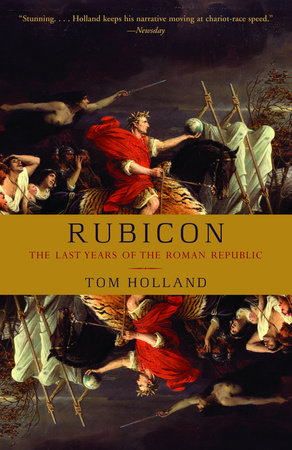
by Tom Holland
Paperback $21.00, buy from other retailers:.

The Leadership Genius of Julius Caesar
By phillip barlag, hardcover $24.95.
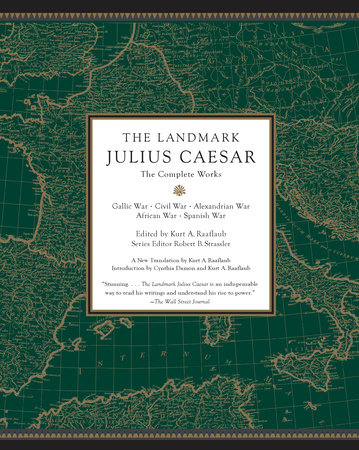
The Landmark Julius Caesar
Paperback $33.00.
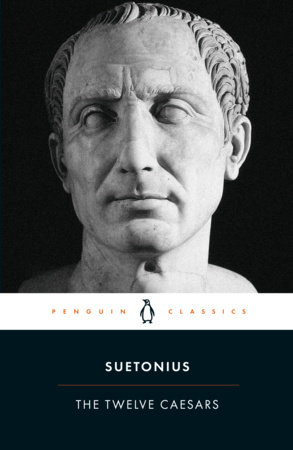
The Twelve Caesars
By suetonius, paperback $16.00.

Paperback $22.00
- Share on Facebook
- Share on Tumblr
More to Explore
Visit other sites in the Penguin Random House Network
Raise kids who love to read
Today's Top Books
Want to know what people are actually reading right now?
An online magazine for today’s home cook
Just for joining you’ll get personalized recommendations on your dashboard daily and features only for members.
Julius Caesar
By james baldwin.

Return to the James Baldwin library , or . . . Read the next short story; King Alfred and the Beggar
Or read more short stories for kids in our Children's Library
Website navigation

Julius Caesar - Entire Play
Download julius caesar.
Last updated: Fri, Jul 31, 2015
- PDF Download as PDF
- DOC (for MS Word, Apple Pages, Open Office, etc.) without line numbers Download as DOC (for MS Word, Apple Pages, Open Office, etc.) without line numbers
- DOC (for MS Word, Apple Pages, Open Office, etc.) with line numbers Download as DOC (for MS Word, Apple Pages, Open Office, etc.) with line numbers
- HTML Download as HTML
- TXT Download as TXT
- XML Download as XML
- TEISimple XML (annotated with MorphAdorner for part-of-speech analysis) Download as TEISimple XML (annotated with MorphAdorner for part-of-speech analysis)
Navigate this work
Caesar’s assassination is just the halfway point of Julius Caesar . The first part of the play leads to his death; the second portrays the consequences. As the action begins, Rome prepares for Caesar’s triumphal entrance. Brutus, Caesar’s friend and ally, fears that Caesar will become king, destroying the republic. Cassius and others convince Brutus to join a conspiracy to kill Caesar.
On the day of the assassination, Caesar plans to stay home at the urging of his wife, Calphurnia. A conspirator, Decius Brutus, persuades him to go to the Senate with the other conspirators and his friend, Mark Antony. At the Senate, the conspirators stab Caesar to death. Antony uses a funeral oration to turn the citizens of Rome against them. Brutus and Cassius escape as Antony joins forces with Octavius Caesar.
Encamped with their armies, Brutus and Cassius quarrel, then agree to march on Antony and Octavius. In the battle which follows, Cassius, misled by erroneous reports of loss, persuades a slave to kill him; Brutus’s army is defeated. Brutus commits suicide, praised by Antony as “the noblest Roman of them all.”
Stay connected
Find out what’s on, read our latest stories, and learn how you can get involved.

COMMENTS
Caesar's gens (clan) name, Julius (Iulius), is also familiar in the Christian world, for in Caesar's lifetime the Roman month Quintilis, in which he was born, was renamed " July " in his honour. This name has survived, as has Caesar's reform of the calendar. The old Roman calendar was inaccurate and manipulated for political purposes.
Julius Caesar was a leader of ancient Rome who significantly transformed what became known as the Roman Empire by greatly expanding its geographic reach and establishing its imperial system ...
Born to power. Caesar was born into the Roman political ruling class, on 12 or 13 July 100 BC. He was named Gaius Julius Caesar, like his father and grandfather before him. Both had been republican officials, but the Julian clan's greatest link to high power when Julius was born was through marriage. Caesar's paternal aunt was married to ...
Gaius Julius Caesar (/ ˈ s iː z ər /, SEE-zər; Latin: [ˈɡaːiʊs ˈjuːliʊs ˈkae̯sar]; 12 July 100 BC - 15 March 44 BC) was a Roman general and statesman. A member of the First Triumvirate, Caesar led the Roman armies in the Gallic Wars before defeating his political rival Pompey in a civil war, and subsequently became dictator from 49 BC until his assassination in 44 BC.
Julius Caesar was a Roman general and politician who named himself dictator of the Roman Empire, a rule that lasted less than one year before he was famously assassinated by political rivals in 44 B.C.E.. Caesar was born on July 12 or 13 in 100 B.C.E. to a noble family. During his youth, the Roman Republic was in chaos.Seizing the opportunity, Caesar advanced in the political system and ...
Julius Caesar was a general, politician and scholar who became dictator of ancient Rome until he was assassinated in 44 B.C., inspiring a play by Shakespeare.
Julius Caesar Biography. Julius Caesar was a Roman general who conquered vast areas of land in the region of Gaul. This significantly expanded the Roman Empire and accelerated the diffusion of Roman culture, into western Europe. Caesar also launched a coup against the failing Senate, and after a civil war set himself up as sole ruler and dictator.
Gaius Julius Caesar was born 12 July 100 BCE (though some cite 102 as his birth year). His father, also Gaius Julius Caesar, was a Praetor who governed the province of Asia and his mother, Aurelia Cotta, was of noble birth. Both held to the Populare ideology of Rome which favored democratization of government and more rights for the lower class ...
Julius Caesar. December 23, 2023 by Muhammad Tuhin. Julius Caesar was a Roman military general, statesman, and dictator who played a critical role in the events that led to the demise of the Roman Republic and the rise of the Roman Empire. He was born in 100 BCE and was assassinated in 44 BCE. Caesar's military conquests, political maneuvers ...
Famous quotes from William Shakespeare's The Tragedy of Julius Caesar. "Cowards die many times before their deaths; The valiant never taste of death but once.". "Death, a necessary end ...
Caius Julius Caesar was born around July 13, 100 B.C. and was stabbed to death in the Roman senate on March 15, 44 B.C. By the time he was killed he had been appointed Rome's dictator for life and ...
A cult of personality developed around Caesar as he minted coins with his image, celebrated his birthday as a public holiday and ruled the Senate from a golden throne. 5. His assassination led to ...
Biographies >> Ancient Rome. Occupation: Roman general and dictator. Born: July 100 BC in Rome, Italy. Died: 15 March 44 BC in Rome, Italy. Best known for: Being the dictator of Rome and putting an end to the Roman Republic. Julius Caesar by Unknown. Biography: Where did Caesar grow up? Julius Caesar was born in Subura, Rome in the year 100 BC.
The career of Julius Caesar before his consulship in 59 BC was characterized by military adventurism and political persecution. Julius Caesar was born on 12 July 100 BC into a patrician family, the gens Julia, which claimed descent from Iulus, son of the legendary Trojan prince Aeneas, supposedly the son of the goddess Venus.His father died when he was just 16, leaving Caesar as the head of ...
Ch 6 Foundations. Julius Caesar was a Roman general and politician who overthrew the Roman Republic and established the rule of the emperors. Caesar used the problems and hardships of the period to create his own supreme political and military power. Roman Julius Caesar is regarded as one of the most powerful and successful leaders in the ...
Explore the captivating journey of Julius Caesar in this in-depth video detailing the remarkable life of one of ancient Rome's most influential figures. From...
Gaius Julius Caesar. You probably know that he was a military general, dictator of Rome for a while, and his famous words, "Et tu, Brute?" (which he actually...
Richard Billows has written a detailed and engaging biography of Julius Caesar that is primarily aimed at an audience unacquainted with the Graeco-Roman world and Classical scholarship. ... In short, this "biography" of Caesar will prove of interest and possible use for a general readership as well as for Classicists perhaps wishing to ...
In this landmark biography, Goldsworthy examines Caesar as a military leader, all of these roles and places his subject firmly within the context of Roman society in the first century B.C. "Adrian Goldsworthy is one of our most promising young military historians today."—Sir John Keegan, author of The Iraq War Freeman, Philip. Julius Caesar ...
The ReadDown. The Best Julius Caesar Biographies for The Ides of March. While the Ides of March is trivia 101 for Shakespeare students, for the dictator Gaius Julius Caesar it was a seriously lousy day. March 15 commemorates Caesar's assassination by conspirators in 44 BC. A brilliant politician, orator and military strategist, Caesar ...
Julius Caesar (1896) is a short biography intended for children and adults alike, before you attempt William Shakespeare 's The Tragedy of Julius Caesar. Nearly two thousand years ago there lived in Rome a man whose name was Julius Ceasar. He was the greatest of all the Romans. Why was he so great?
Synopsis: Caesar's assassination is just the halfway point of Julius Caesar. The first part of the play leads to his death; the second portrays the consequences. As the action begins, Rome prepares for Caesar's triumphal entrance. Brutus, Caesar's friend and ally, fears that Caesar will become king, destroying the republic.